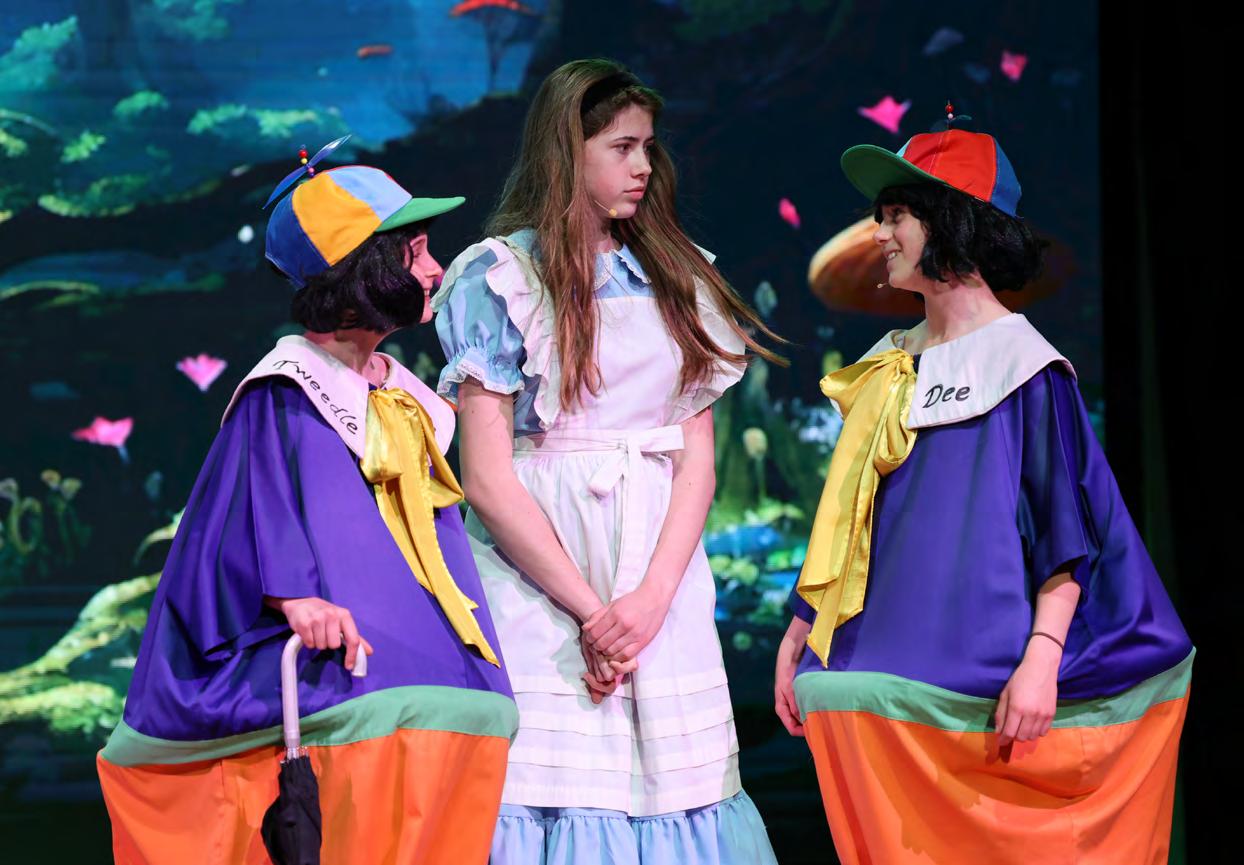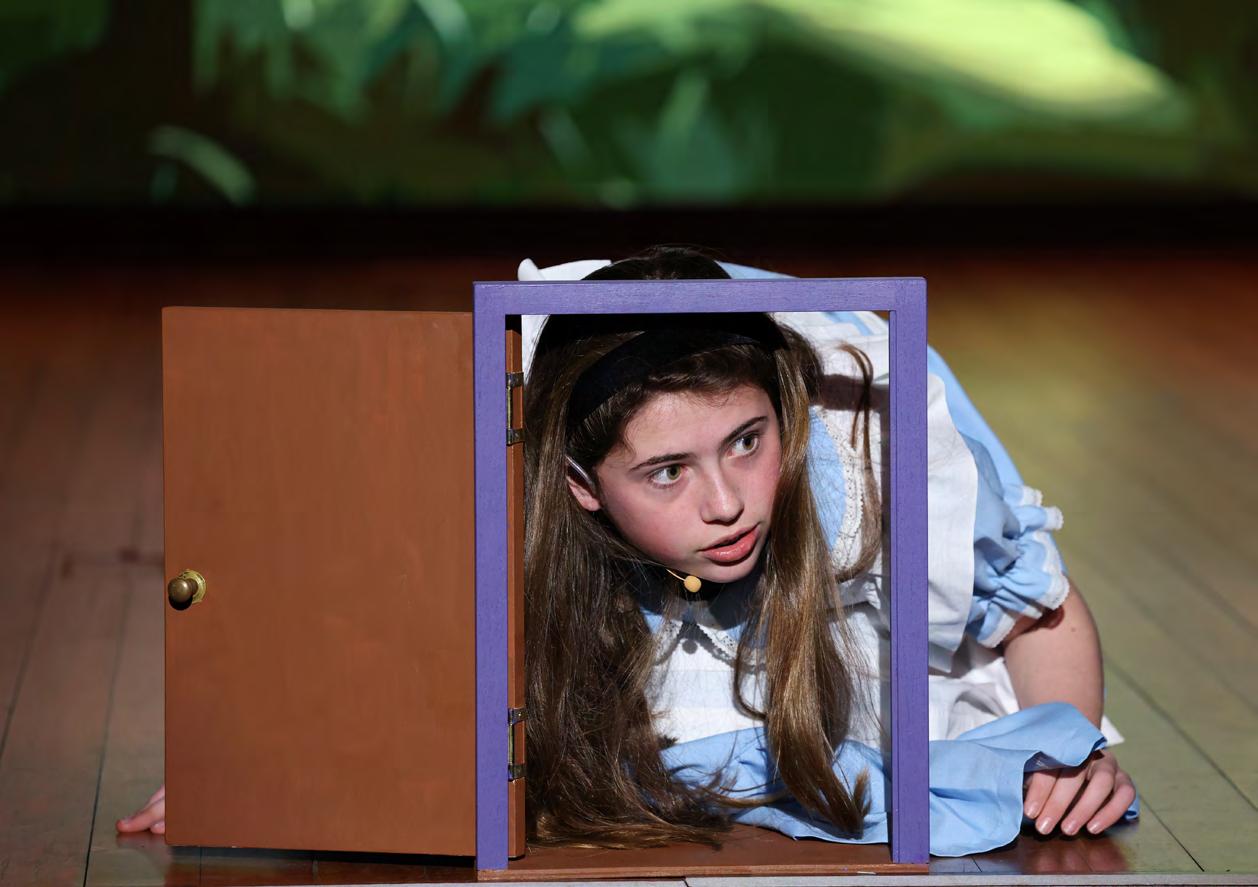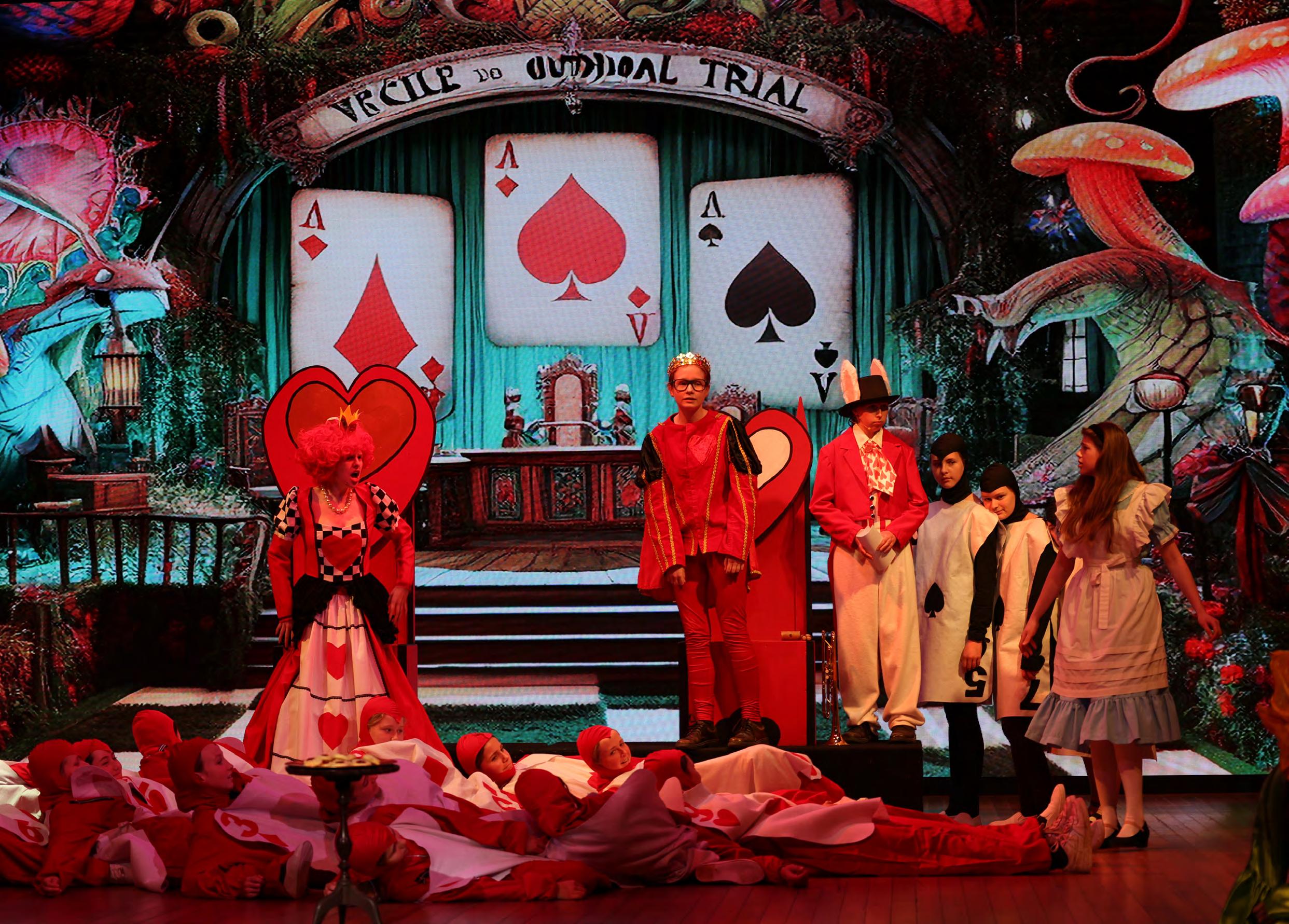A FRENSHAM SCHOOLS MAGAZINE
Does the size of a school matter?
Message from the Head
Oxbridge Programs
Year 10 students in Paris, New York and Oxford

TERM 3 NO 2
Sister School visit to Frensham Junior School Science Environmental Sustainability

A FRENSHAM SCHOOLS MAGAZINE
Does the size of a school matter?
Message from the Head
Oxbridge Programs
Year 10 students in Paris, New York and Oxford

TERM 3 NO 2
Sister School visit to Frensham Junior School Science Environmental Sustainability

Over the past few months, we have been interviewing Year 5 students for a place at Frensham in Year 7, 2026. One of the questions we are often asked by parents at these interviews is, “does the size of a school matter?”
Frensham is a very small secondary school and Frensham Junior School is a comparatively small primary school, and like many schools — or at least those that aspire to be great — we attempt to offer broad experiences for our students. That is, experiences that recognise the need for the multifaceted development of each individual, and aim to enhance intellectual, spiritual, social and physical growth.
Optimising multifaceted development for each individual within a conventional schooling structure presents challenges. Conventional schooling demands that students’ progress through programs and activities with their particular year group. Underpinning activities for each year group are certain assumptions; for example, it’s assumed the majority of students in that cohort require a certain level of learning experience to enhance their development. Of course, these assumptions are often wrong. Some students are not yet ready for the experience; others have already moved beyond it.
Like Frensham and Frensham Junior School, most good schools now have specialist Diverse Learning Teams. Systems exist to recognise and cater for the needs of High Potential and Gifted Learners and for those learners with additional learning needs. In conjunction with the differentiation of learning that already exists within the Frensham Schools classrooms, this goes some way to alleviating problems,
but it is not enough. In order for schools to truly personalise the learning of students, they have to first know the student. Staff must know them as a learner and as an individual.
Students themselves need to know that they are known. This may seem like an unusual statement but most research suggests that unless a child feels known, and they trust the knower, it is difficult for quality learning to take place. There is a lovely statement attributed to prominent American child psychologist Haim Ginott, that says, “To reach a child’s mind, a teacher must capture their heart. Only if a child feels right can they think right.” It also helps if the school knows the families of their students and understands the life experiences the student may have had or is currently having.
Larger schools can offer an extensive range of programs that can go some way to meeting individual needs of their students. This can happen more by chance than by design. Whilst we also offer broad programing at Frensham Schools, it is different from ‘knowing’ every child and personalising their schooling experience to ensure they are challenged and supported appropriately. It is the latter that we strive for at Frensham Schools every day, and it is one major advantage of a smaller school population.
So, when faced with the question of school size from potential students and their parents during interviews, I am able to truthfully answer: that at Frensham and Frensham Junior School every child is known, and that this is an important point of difference for us. It is something our staff work hard to achieve, and it is only possible because our size affords us this luxury.
Geoff Marsh Head of Frensham Head of Frensham Schools

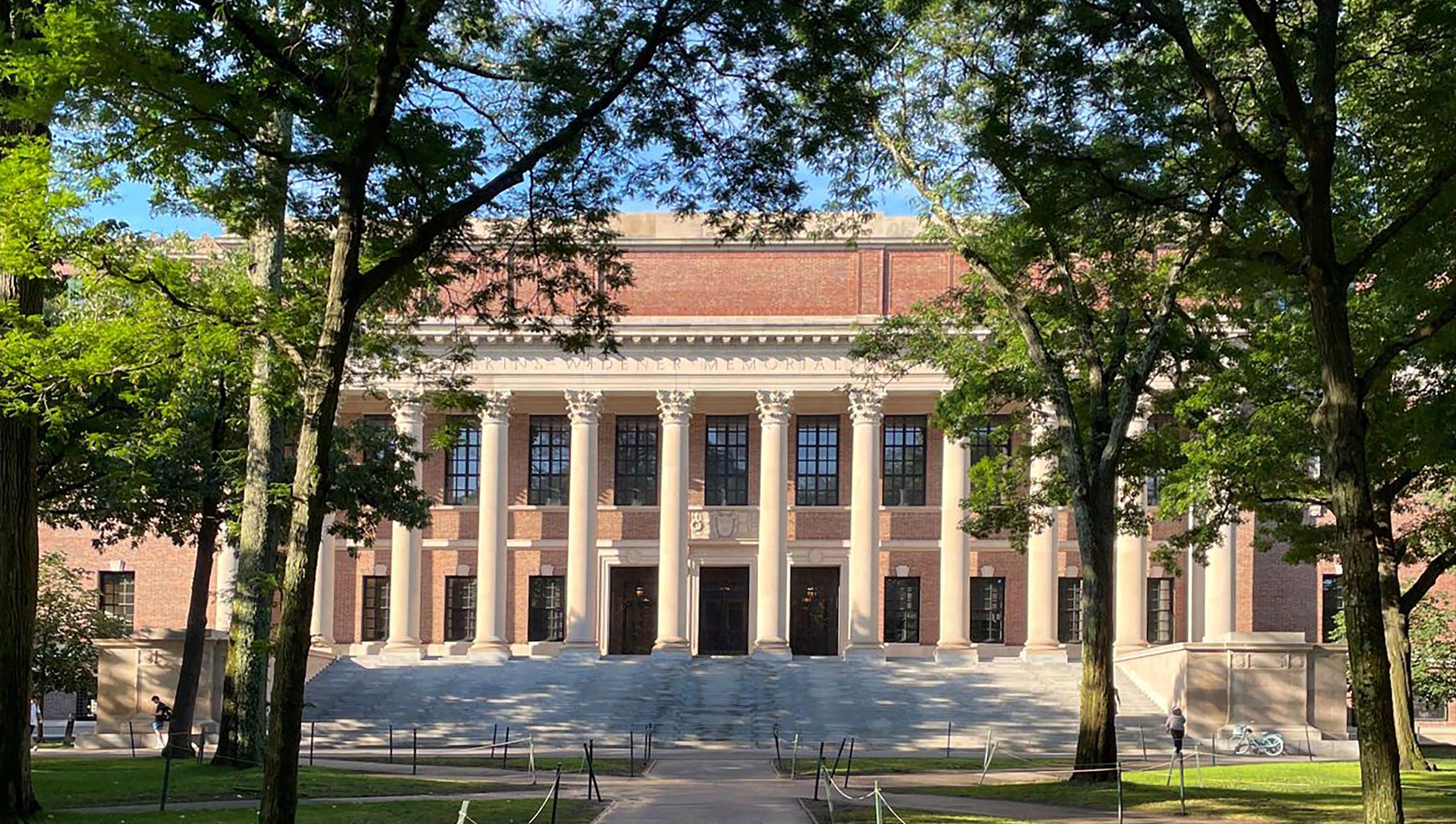
What does it mean to understand something? I don’t mean to know something – that is easy. But to understand it? For example, to know somebody means you meet them once, remember their name, maybe what they do for work. But to understand that person requires much more. You need to know their context, their history, their likes, dislikes, proclivities, habits (good and bad), dreams and fears. To do this takes time. No one understands someone on their first meeting (despite what romantic comedies might tell us). You need to spend significant time with somebody to understand them, and watch them respond to different situations. You need to disagree with them, work to achieve something together with them, feel success with them. Moving this analogy to a different context then, what does it mean to understand the experiences of soldiers at war? To understand the meaning behind Of Mice and Men? Thermodynamics? Vermeer? Cicero? Many of our students may know features of these big topics, but do they understand them? And how do we teach for this understanding?
From June 24 to June 28, I was fortunate to attend the Harvard Graduate School of Education “Project Zero Classroom”. The
Harvard Graduate School of Education is the world’s foremost education school, responsible for major shifts in educational research, including Howard Gardner’s Theory of Multiple Intelligences, David Perkins and Tina Blythe’s Teaching for Understanding Framework and Ron Ritchhart and Mark Church’s work on Cultures of Thinking.
The conference asked four big questions, all of which were relevant to our work here at Frensham Schools.
• What does it mean to understand? How does understanding develop?
• What are the roles of reflection and assessment in learning?
• How can we nurture critical thinking and creativity?
• How can we design learning experiences for and with diverse learners and contexts?
Exploring these throughlines was a career defining experience. Led by some of the world’s best teachers, in an environment that demands and consistently redefines academic excellence, alongside passionate educators from around the world, three key ideas consistently rose to the surface.
As outlined above, there is a significant difference between understanding and knowing. Within a teaching and learning context, this distinction creates challenges. The crowded nature of the syllabi of many disciplines leads to a fast paced curriculum that lends itself more to surface knowledge rather than deep understanding. Mindsets for understanding were discussed, as was the REACH framework, which provides students with lenses to frame the style of thinking required for a task, and providing teachers with specific moves to enculturate approaches to learning. Another topic explored how meeting time here at school can be focused towards growing understanding, rather than bureaucracy. The end result of this line of thinking was a clear mindset and toolkit targeted towards growing individual and collective understanding.
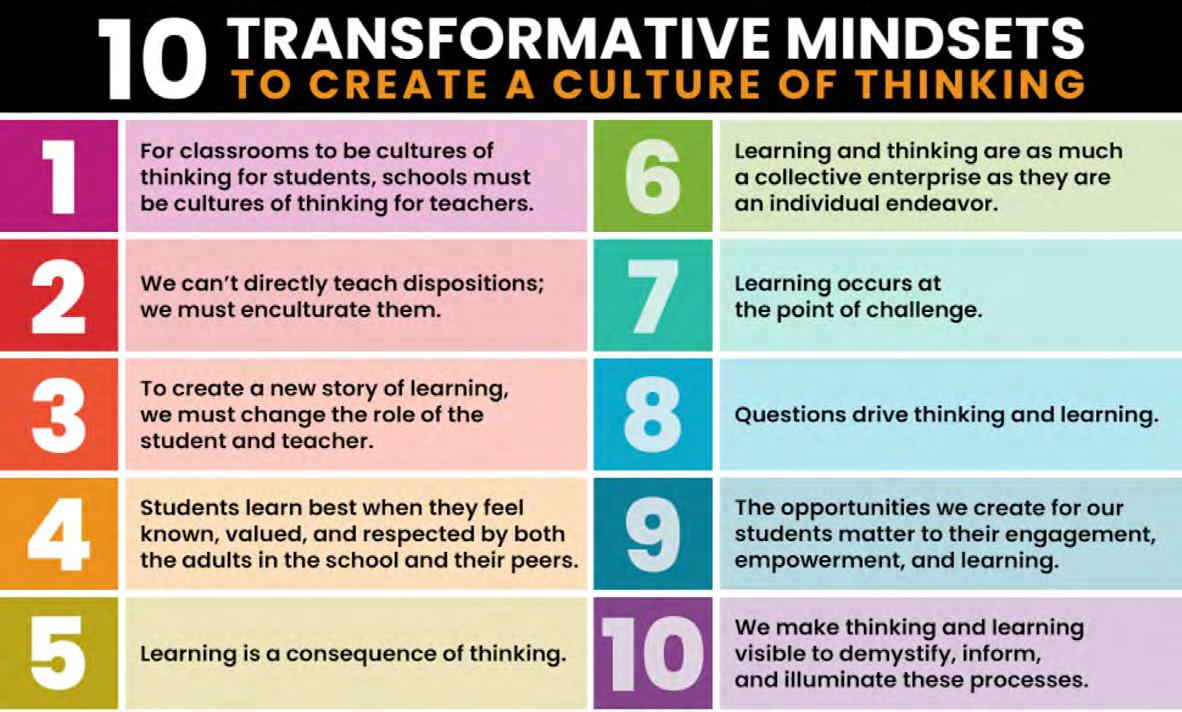
One of the most striking elements of the approach of the Harvard teachers was the pace of classes. Space was given for thinking, reflection and for collaboration. There were intentional moves to slow delegates down, which fought against our urge to move as quickly as possible to maximise learning. The result was a deeper insight into our thinking and clear examples, modelling the use of time in instruction. For example, during a session outlining the ‘Open Canopy Approach’ to teaching and learning, one of the fundamental
aspects is ‘slow looking’, specifically in relation to global connection and competencies. The result was a rich and detailed discussion showing not only the differences between communities, but the similarities too. Taking time has always been a centrepiece of the cultures of thinking approach that we have used at Frensham, but it sometimes takes a reminder to fight against the increasing pace of the modern world.
Idea
This may seem obvious, but in an educational context driven by league tables and learning outcome indicators, we can miss the importance of the unmeasurable elements of development. Speakers from “The Good Project”, whose research focuses on teaching and learning that is excellent (high quality), engaging (meaningful) and ethical (socially responsible), allowing students to grapple with complexity and their own opinions and beliefs related to present and future work, discussed globally minded pedagogy, taking the initiative to connect students across the globe. Speakers from Harvard’s Centre for Digital Thriving spoke about the way in which students need to positively engage with technology, and how to structure conversations on the issue that are both critical and optimistic. The constant focus of the course was on helping students see themselves as interconnected humans, with both an internal and external contexts to engage with. Developing rich, deep and wide knowledge is essential to future success, but knowing how and why to use this knowledge is equally important for our students to flourish.
I would like to thank the Winifred West Schools Foundation and all its supporters for the opportunity to attend Harvard and learn from world leaders in their field. The Foundation Scholarship is a unique opportunity that is essential to the continued growth in teaching and learning across our schools.
Nathan Bessant Director of Studies

During the winter holiday break, several Frensham students were fortunate to participate in the Oxbridge Academic Programs in Europe and the United States. These programs provide a summer study experience for adventurous students from over 80 countries. Designed for students in grades 8-12, the programs range from between one to four weeks and are hosted at some of the world’s most prestigious universities in England, France, Spain, and the United States. Participants select up to two subjects to study—one as a Major and another as a Minor or Workshop—from a diverse range of over 150 options. Each course is taught with a hands-on, experiential approach, ensuring that students not only gain academic knowledge but also immerse themselves in the rich cultural and historical contexts of their host cities. Frensham girls who participated in the 2024 Oxbridge Programs tell us that the blend of academics and cultural exploration was an exciting way to develop a deep passion for learning.
Attending the Oxbridge program in Paris was an extraordinary experience. Every day was filled with exciting activities, from exploring the charming streets of Montmartre to engaging in thought-provoking seminars that made learning feel like an adventure. The blend of rigorous academics and immersive cultural experiences was nothing short of magical. Afternoons were a joy as we explored Paris’s iconic landmarks, like the Eiffel Tower and the Louvre, and wandered through picturesque neighbourhoods like Le Marais. We loved every moment. Savouring delicious French pastries at local cafés and participating in lively discussions with peers from around the world are memories we cherish. The program was challenging, making it an unforgettable experience that left us with a deep appreciation for our teachers at Frensham. Among the various classes available, we chose to take the Culture and Cuisine class. The class not only explored the history and evolution of French cuisine but also provided handson opportunities to learn from skilled chefs in Parisian kitchens. We were taught by incredible staff and our teacher Tom taught
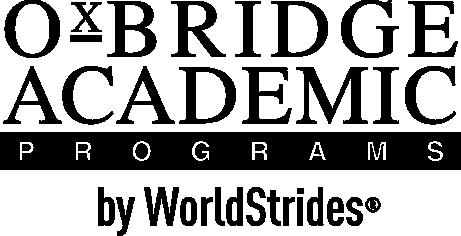
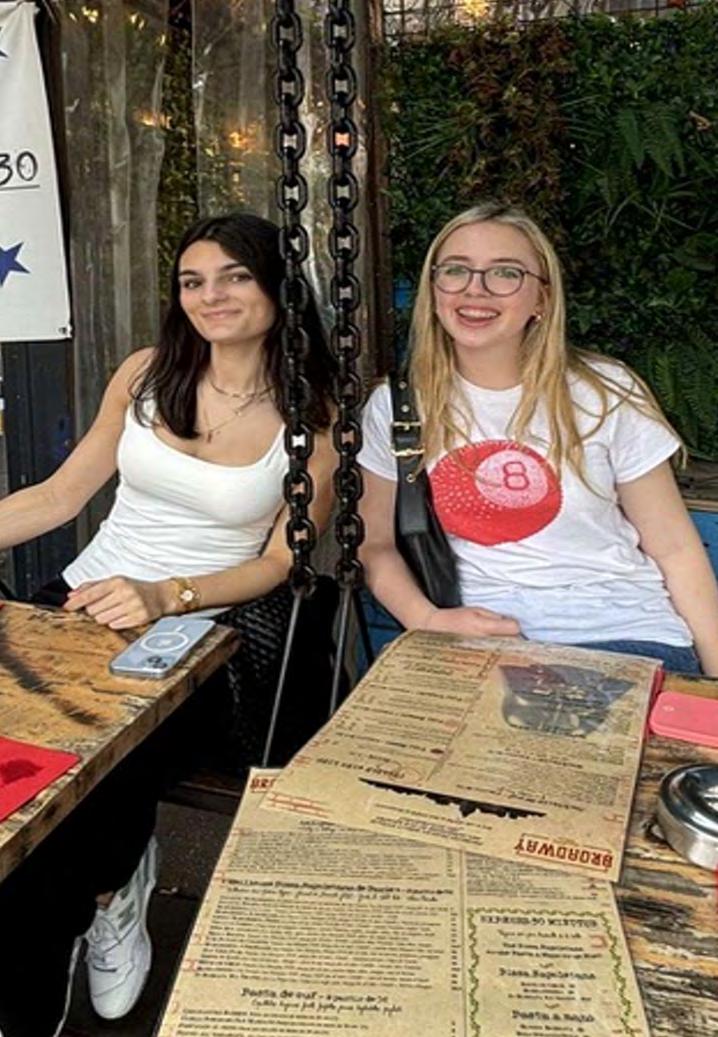
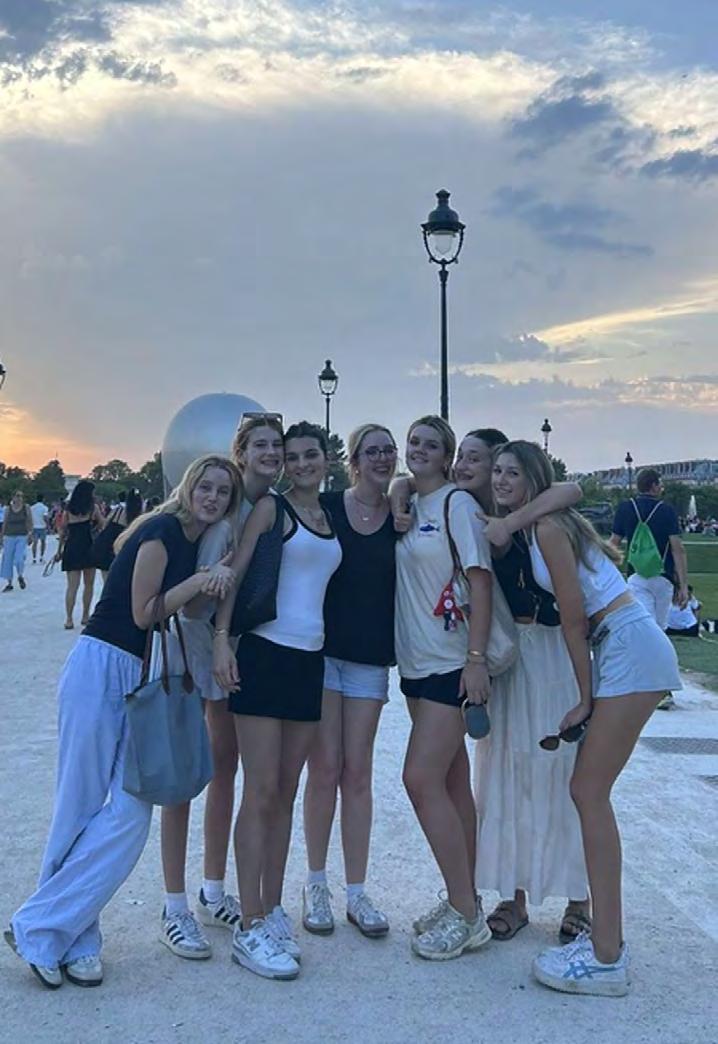
us several facts about cooking in Paris! Our day-to-day itinerary included having breakfast in the cafeteria with lots of girls, similar to a morning at Frensham. The afternoon was often filled with activities for exploring Paris, whether it was visiting museums, having a picnic along the Seine, or enjoying a meal at one of the amazing restaurants in the city. We were fortunate to be staying in a secure and safe neighbourhood where the Luxembourg Gardens were across from us providing a lovely environment to study and explore. As we were there during the Olympics we enjoyed the Opening Ceremony from the comfort of our auditorium, waving Australian flags and chanting Australian slang. Even though we were away from home we managed to bring some Australian culture with us. Returning to Frensham after the Oxbridge Program in Paris, we are bringing knowledge and experiences that we can’t wait to share with friends and family. Additionally, the experience has taught us the value of curiosity and exploration, which we will carry into our studies and interactions at Frensham.
When I applied for the New York Oxbridge Program I could never have imagined how amazing this experience would be. Going to New York allowed me to explore so many unique places that I have always dreamed of going to.
During the week I had my major class, which was Sports Business, from 9:00am to 12:30pm every day except Sunday. This course was so immersive and interesting as I love sports and learnt about many career pathways that are available which I never would have known about otherwise. In this class we had two guest speakers who currently work in the sports industry, and who have experience of many large scale sporting events. Our class took day trips to iconic stadiums such as Madison Square Garden, Yankee Stadium and Mets Stadium. We also went to the National Hockey League (NHL) Headquarters to meet with the Vice President where he spoke about the industry and his experience. In the afternoons on Monday, Wednesday and Friday I had my minor class, Fashion, from 2:00pm to 4:00pm. In this class our goal was to complete an upcycled outfit from multiple thrifted pieces of clothing. We had two trips during this course, our first to the Upper East Side to look into vintage and thrift shops to source our items. Between the two classes we had a break to explore our area and get our lunch. In the afternoons there were activities planned or you could explore the rest of Manhattan with the people you met along the way. Some of the planned activities included going to Fifth Avenue, the Rockefeller Centre, Summit One and the Highline. All the staff working with the program were so caring as they helped us navigate the city.
Whilst at Oxbridge I met many kind and interesting people from across the globe. Most people who attended the programme were from Spain, Argentina, Turkey, Russia, America and Australia. With my group of friends, we explored all over New York, adventures I will remember forever. To anyone who is interested in participating I would highly recommend it. I will always remember this experience, as well as learning many skills that I have taken back with me to Frensham.
Applying for a month-long Oxbridge summer program at Oxford for mid-2024 was the best decision I have ever made. Every day, except Sundays, I participated in a 3.5 hour class for my major, which was Archaeology. On top of that I had a two hour class for my minor on Monday, Tuesday and Wednesday, which was Classics: I studied Ancient Roman and Greek society. My major delved into the world of being an Archaeologist. My teacher, Irene Torreggiani is an Environmental Archaeologist and specialises in pollen. Learning from her was such an enlightening experience. We were also given lectures by other people in the field and were taught unforgettable lessons on palaeontology, cognitive archaeology, and more. I learnt about how broad the field was and how I could go on with a career in archaeology.


I met many absolutely wonderful people during the course. I made memories with them that I will forever cherish. Some include punting along the River Thames, exploring the gorgeous architecture and vibrance of Oxford itself and participating in fantastic program activities like a fashion show, talent show, tours of Christ Church College and the Final Ball. We were given lectures from political journalists, astronauts, doctors who spoke to us about finding the exoplanet and the complexities of the US Election. They even gave us a chance to give lectures to other students. I gave my very own lecture on niche Aussie Pop Culture /Politics and was able to include some lines from Julia Gillard’s ‘misogyny’ speech. The people running the program included Oxford students and high school teachers from America who were all extremely caring of not only our academics, but also making sure we were getting as much as possible out of the program.
The program contributed to my academic development by allowing me to gain knowledge on subjects which I am passionate about. I gained a new appreciation for learning in a way I wasn’t used to and it gave me a new perspective on my education in the future. It also gave me a new outlook for university life, which isn’t far away. It made me excited to be learning about areas which I’m passionate about, and getting to work with people who share the same interests from all around the world. I found that my confidence in making new friends and academic life has increased. The Oxbridge program was an experience which let me get to know not only about Ancient Egypt and human remains and people from other backgrounds, it also taught me about myself, and the kind of person I want to be. I quickly learnt how people can become lifelong friends in the span of one month. During the Closing Ceremony, I, along with my two friends, Jonah and Ali, were awarded the Spirit of the Program award, which gave me a new look on how to approach new opportunities, and on the positives of putting yourself out there. I would highly recommend applying to this program, because if you go, you won’t regret it.
Molly Macqueen Year 10 Coordinator

ince 1990, Frensham Junior School has nurtured a warm connection with Hokuriku Gakuin Elementary School, in Kanazawa, Japan. Through this connection, students learn the language, find friends overseas and develop respect and understanding for another culture. Recently, 32 Japanese students visited Frensham Junior School. They enjoyed three days of activities at shool and were hosted by our families. Students had plenty of stories to tell about their hosting experiences, with Evie in Year 2 telling us, ‘My new friends and I had fun together. We played lots of things and got along really well. They really liked the sliders we ate but not vegemite.’ The aversion to vegemite seemed to be a common theme!
Overall this was a wonderful opportunity to build relationships beyond language and a reminder of the similarities between children, no matter where they live in the world. All students enjoyed the experience. We will be offering a trip to Japan to our Year 4, 5 and 6 students in 2025, where they will have the opportunity to have a similar experience at Hokuriku Gakuin Elementary School and then spend several days travelling and enjoying the vastly different cultural experiences, food and scenery that Japan has to offer. This unique experience is an eye-opening opportunity for our students, who
often participate in everything from cleaning the school (all Japanese children clean their own school every day) to visiting shrines and temples and participating in cooking or music demonstrations. We look forward to reporting back next year when we visit our newly-made friends in Japan.
Anne Graham Deputy Head Frensham Junior School
I enjoyed the activities at school with the Japanese visitors, especially the boomerang decorating and throwing.
Mimi, Year 2
It was very interesting and fun having two Japanese boys at my house. They knew a lot about the same things that I am interested in - like Nintendo!
Inigo, Year 3

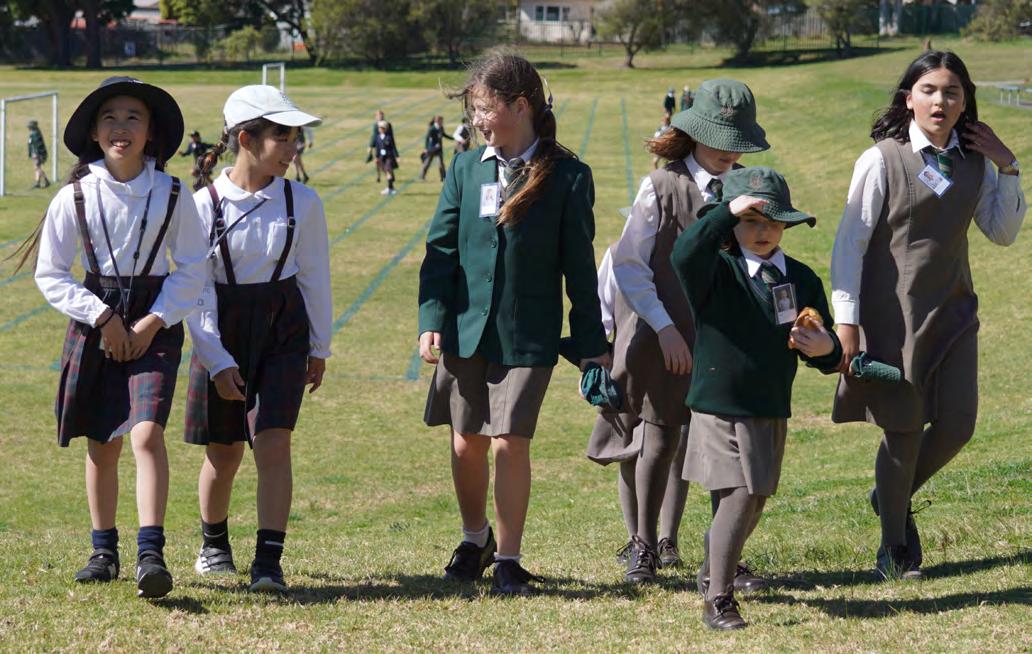


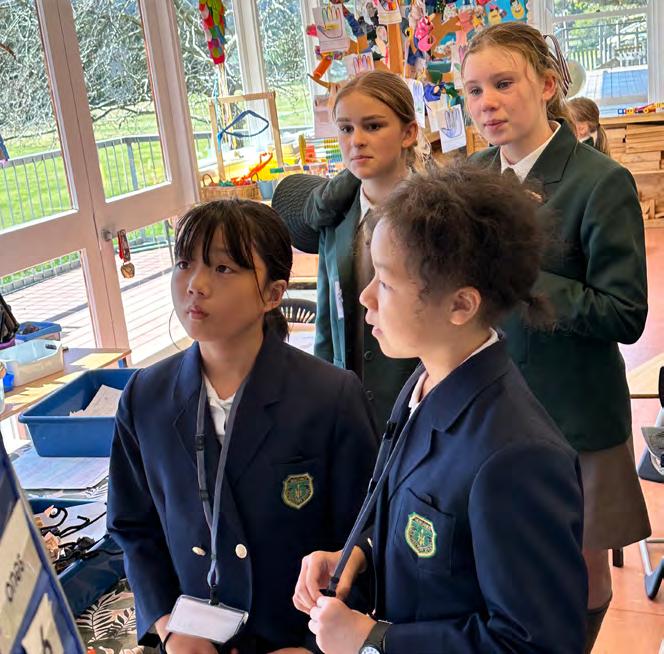
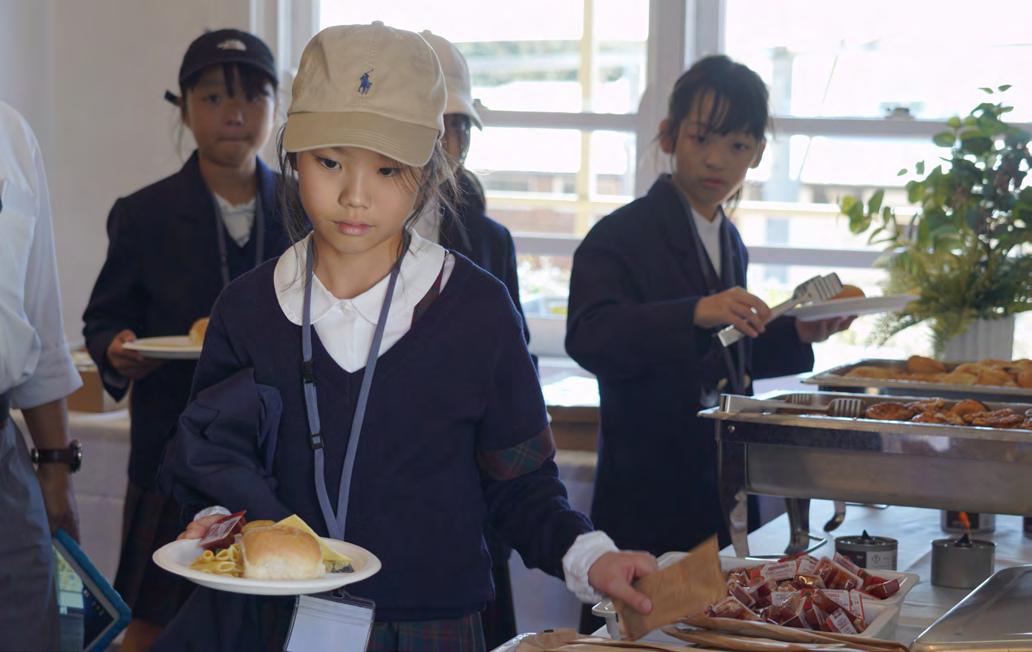
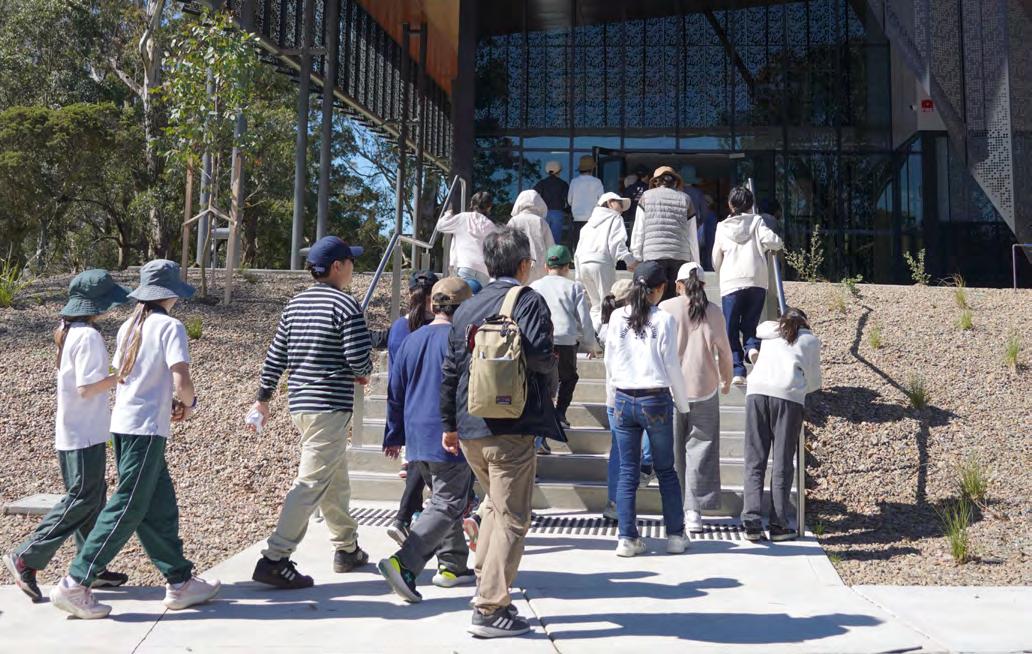
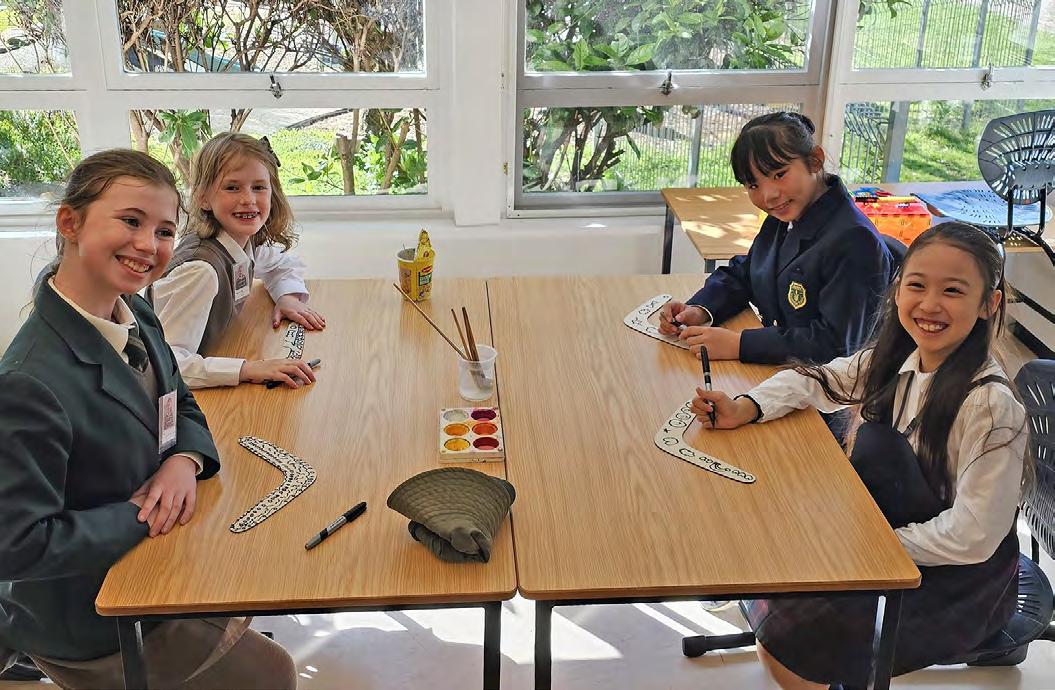

During our recent Japanese exchange program, Hokuriku Gakuin staff asked about the badges pinned to each Year 6 student’s blazer. I explained that all Year 6 students are leaders at Frensham Junior School, not just a select few, and that this badge reflected their area of responsibility and service.
At Frensham Junior School, all Year 6 students are supported to have the courage to contribute to community, to display initiative in influencing others in positive ways, and to propose new ideas to bring about positive change.
In Year 5, students are asked to consider their areas of interest, self-identify, leadership strengths, and propose areas of responsibility for their Year 6 leadership role. These proposals are considered, and students are consequently allocated a role which will foster their leadership skills and strengths and meet the needs of the school community.
When students are provided with the opportunity to lead alongside each other and serve their community, it builds confidence, encourages responsibility, and develops proactive problem solving skills. This fosters a strong foundation for each student’s future academic and personal growth.
Here are some Year 6 reflections on the Frensham Junior School Leadership Program:
Leadership to me means helping people whenever, and however, you can. Leadership is like being the captain of a boat. You’re in charge, but it also doesn’t work unless everyone helps, and you acknowledge everyone’s ideas. What I love most about leadership at Frensham Junior School, is that everyone gets a role, and they have input into the choice. My role as Environmental Monitor involves helping the wildlife, both flora and
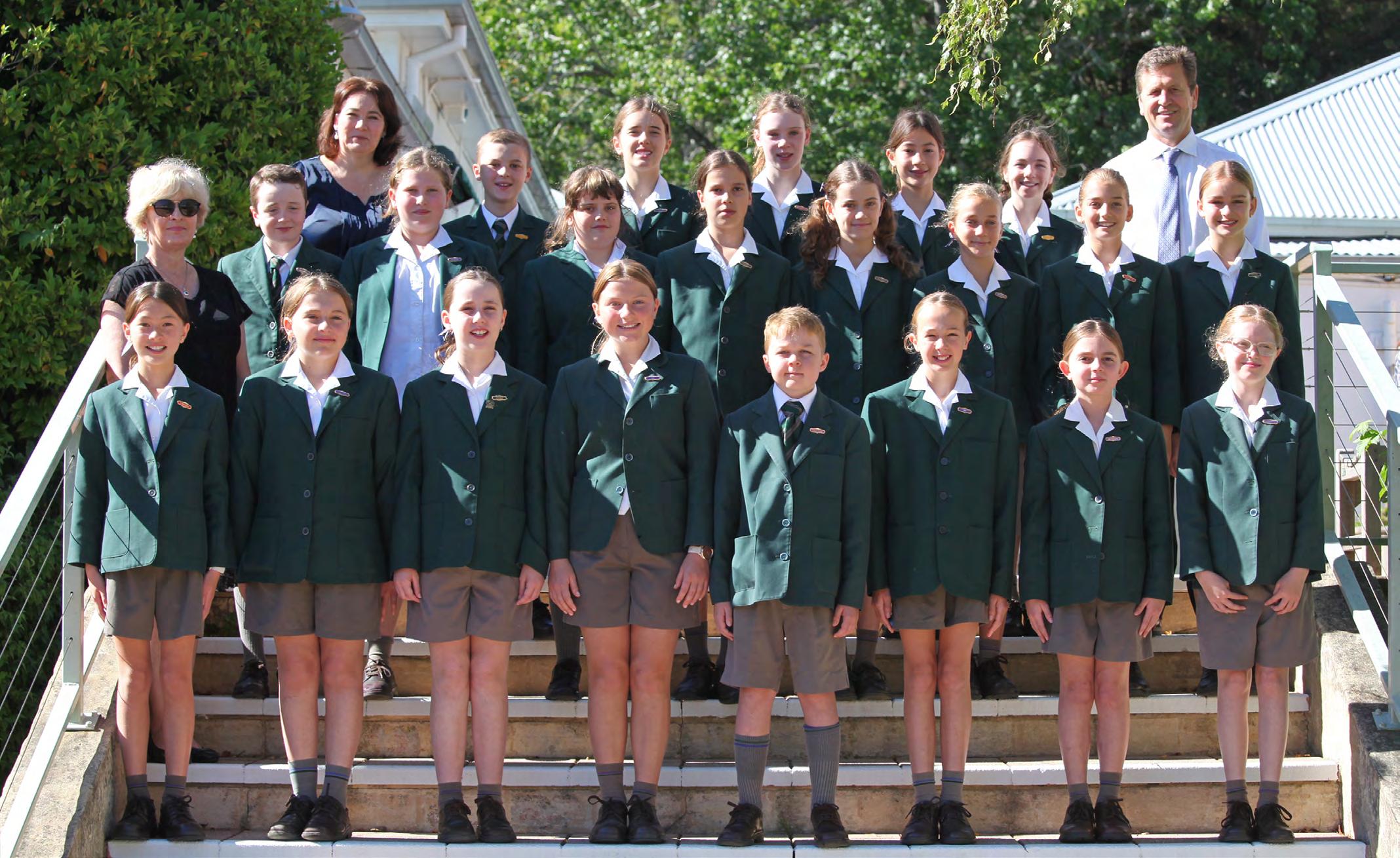
fauna, and working with the Wildlife Monitor and Recycling Monitor to help keep our natural environment here at Frensham Junior School clean and healthy. From my role I have learnt that no action is too small, and everything helps. The Frensham Junior School values of doing and service in particular are important to my role, because you have to be doing work, and giving service to the community.
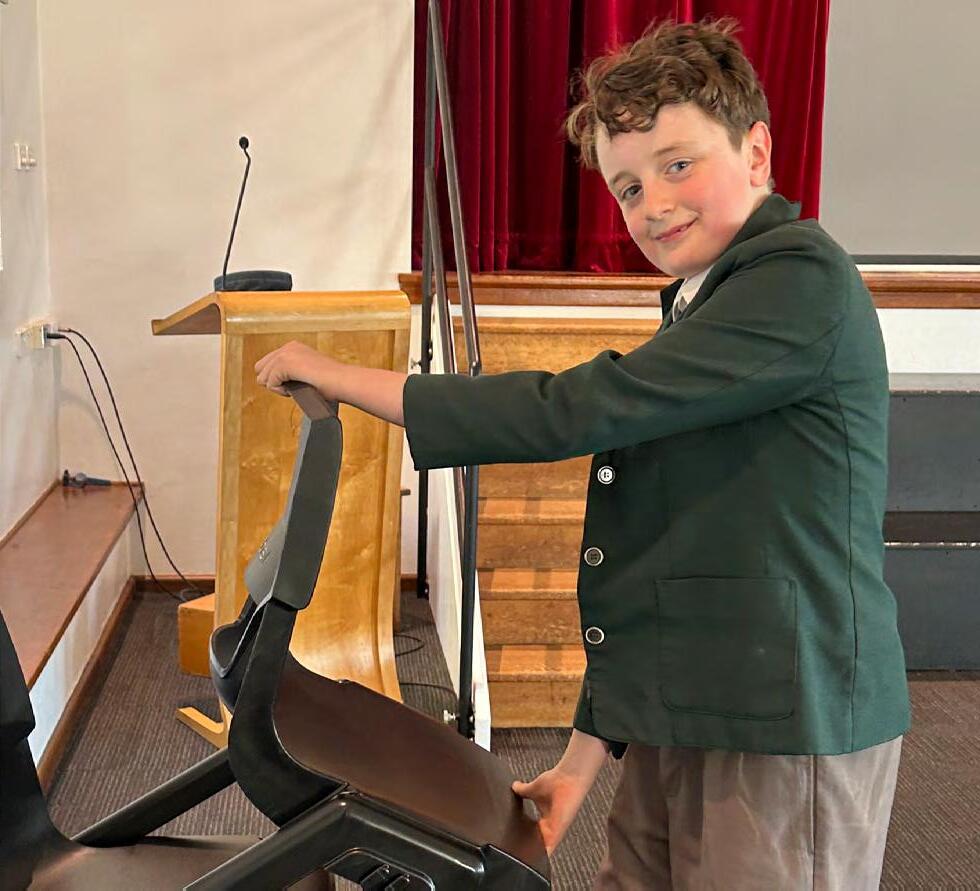
Leadership at Frensham Junior School means the world to me because of the way that the school has allowed everyone in Year 6 to take on some responsibility and become a leader instead of just having some individuals who have responsibilities while others don’t. I believe that this concept of leadership is crucial to the success and growth of the mindsets that students in Year 6 have, and that it will have an impact on them in the future. Because of the amount of chances I have had to take on responsibilities, I have been able to learn the many qualities of being a leader because taking responsibility, I have learnt, isn’t always fun, but it really helps you to give back to the school that has done so much for you, and this is exactly what Frensham Junior School did for me.
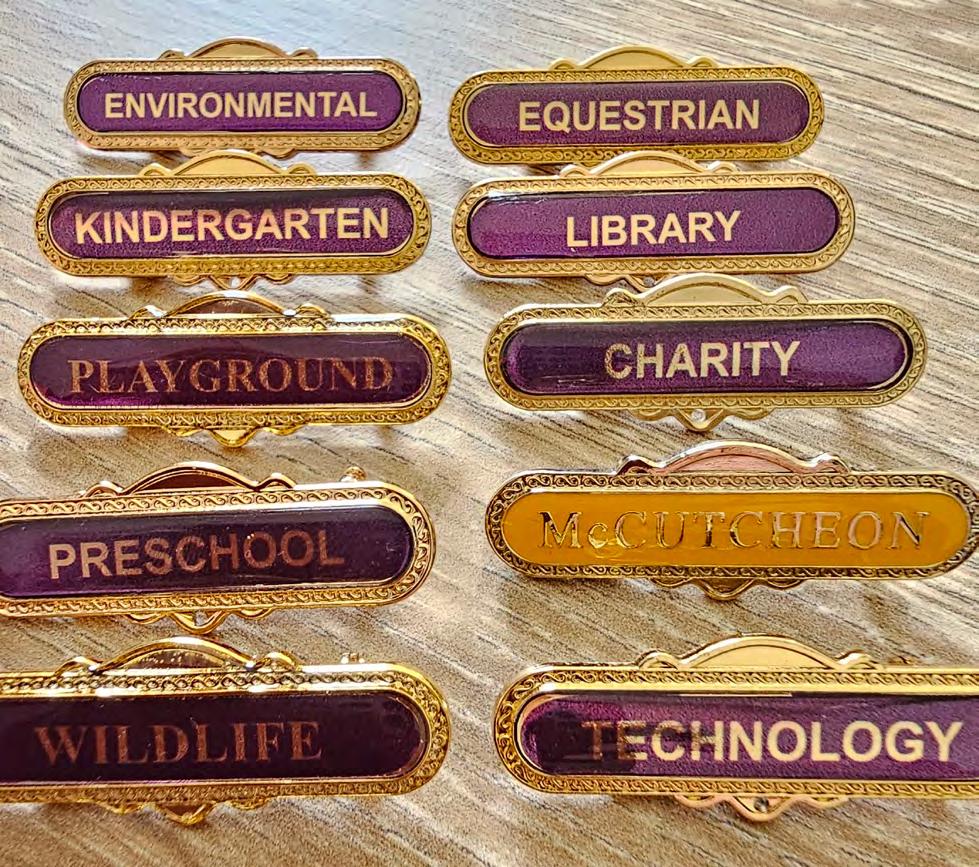
The rich environment the school provides in giving every student a leadership role in Year 6 is beautiful. I believe that this provides such a vibrant and positive place for students to feel included and important amongst their school community. Leadership roles are usually given to only a couple of students in most schools, so when I came to Frensham Junior School, I was so surprised at the fact everyone got one.
Lucy Gregory Head of Frensham Junior School
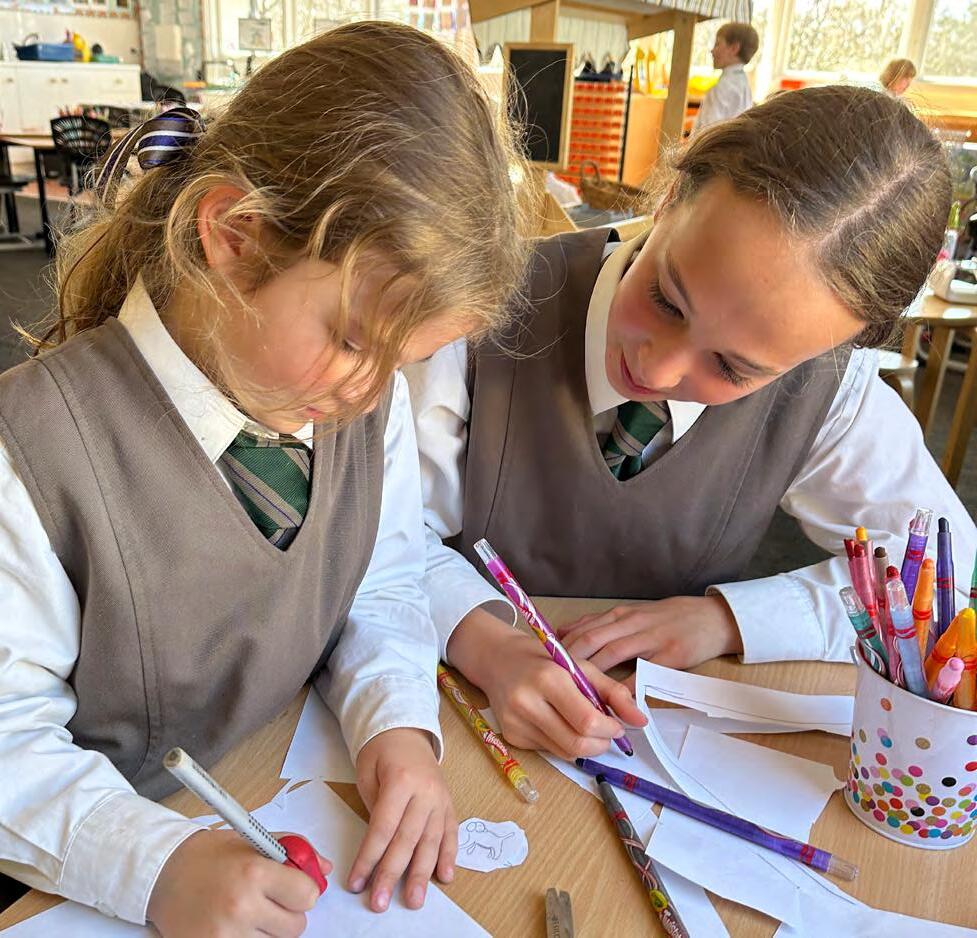
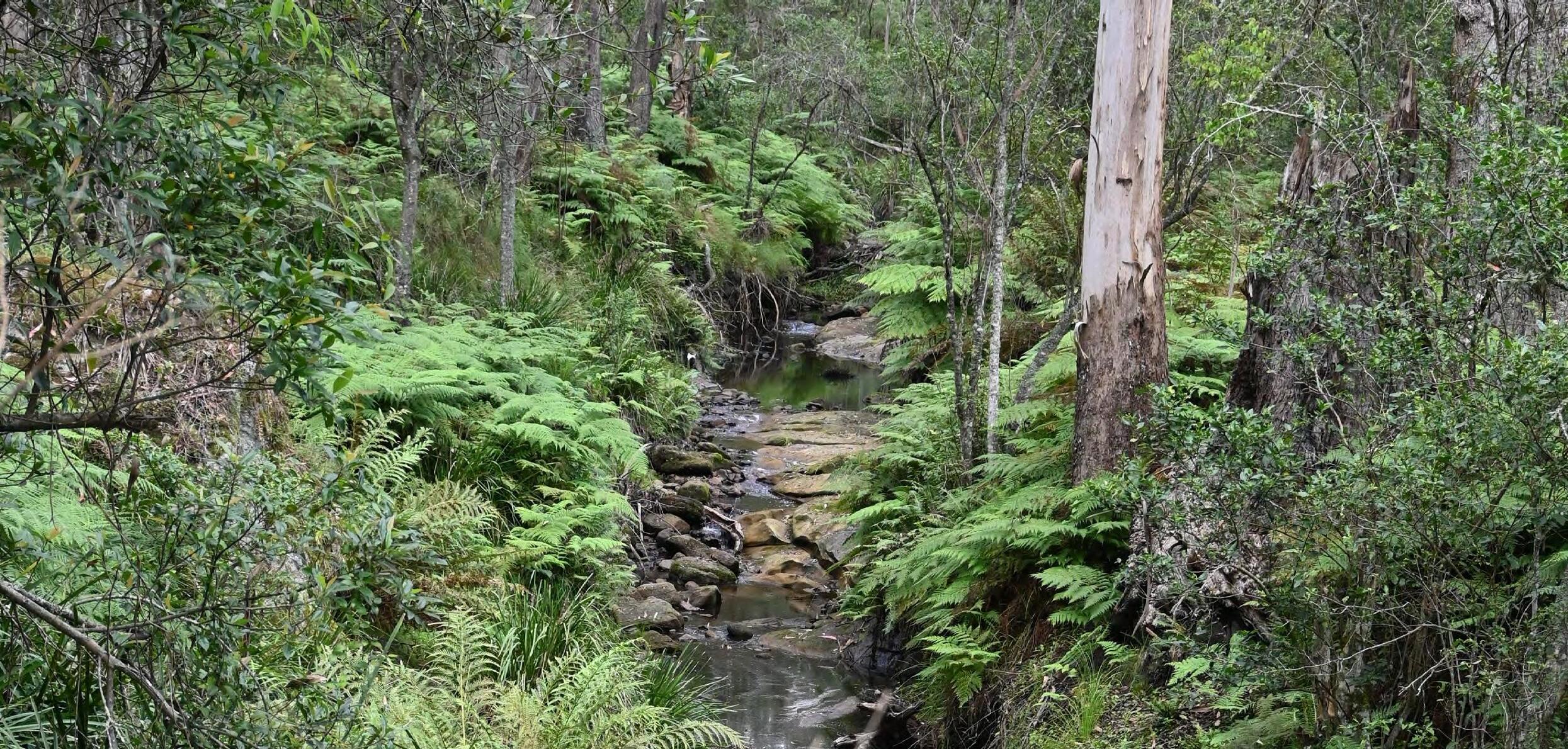
One of my favourite parts of the Frensham Campus is the Upper Holt. I love to walk around the loop and see all the wonderful diversity of life that shares our school with us. I have seen echidnas, wombats, kangaroos, lizards, snakes and a rich variety of birdlife up there. We are so lucky to have so much natural bush around us.
In August we celebrated National Science Week and this year’s theme was “Species Survival: More than just Sustainability”. It was about understanding that we are all part of the big, interconnected web of life. Every creature, from the bees that pollinate our fruit trees to the worms that enrich our soil, plays an essential part. Even flies have a role in our ecosystems as food for other organisms and in decomposing dead matter. The survival of other species doesn’t just protect nature’s beauty, it ensures the health of the ecosystems that provide our food, clean water and the air we breathe.
The United Nations have 17 Sustainable Development Goals that they call our “shared blueprint for peace and prosperity”. The goals are human-centred but if we look closely at them, they are related to the survival of other species as well.
Goal 2 is “Zero Hunger”. This goes beyond human nutrition. Sustainable agriculture supports balanced ecosystems and protects
the pollinators crucial for our food crops. There is a tiny midge which pollinates cacao flowers. Without it we wouldn’t have any chocolate! Biodiversity contributes to food security and nutrition by providing nutritionally diverse foods. Even though they are managed by humans, farms are still ecosystems. The plants, soil and animals all depend on one another for nutrients and habitat. There is growing evidence that diverse crop systems provide more varied and healthier food for humans and livestock.
Goal 6 is “Clean Water and Sanitation”. This isn’t just about human health. Clean water might be essential for our homes, farms and businesses but it also supports countless aquatic species as well as migratory paths for wildlife. Research has shown that increasing the diversity of species within water systems promotes clean water. The more species within and around a river the healthier it is.
Goal 13 is “Climate Action” which is about protecting our shared future. In our coastal areas we are already seeing storm surges and tides eroding homes and land, our Great Barrier Reef is experiencing changes in ocean currents and water temperature while all of Australia is experiencing the effect of extreme weather like drought, bushfires and flooding. Species that could become endangered or extinct include: those living near the upper limit of
their temperature range (e.g. in alpine regions), those with restricted climatic niches, and those that cannot migrate to new habitats due to habitat fragmentation or lack of alternatives. Flying foxes, fish, corals, bogong moths, marine turtles, mountain pygmy possums and koalas are just a few examples of species that climate change is harming right now. Ultimately the effect on humans will be just as devastating. Losing these species reduces the diversity of living things and then our ecosystems suffer.
Goal 17 is “Partnerships for the Goals”. This goal ensures that not only are conservation efforts well-funded but that valuable local and Indigenous knowledge is incorporated into our preservation strategies. By embracing the wisdom of different cultures, especially First Nations People, we can learn to live in harmony with nature and champion the diverse lives sharing our planet. Mr Marsh has spoken about
what he has learnt from our local Gundungurra elders and we will all see the effects of a cultural burn in the Lower Holt. Strategies like these will help us to maintain the species diversity in the 300 acres it is our responsibility to maintain for future generations of Frensham students.
In the wake of Science Week I’d like all of us to think about things we can do to maintain species diversity. Saving paper and electricity are a good start, but what else can we do as a school to be more sustainable and to ensure that there is a diversity of species sharing this planet with us?
Alison Andrew Head of Science
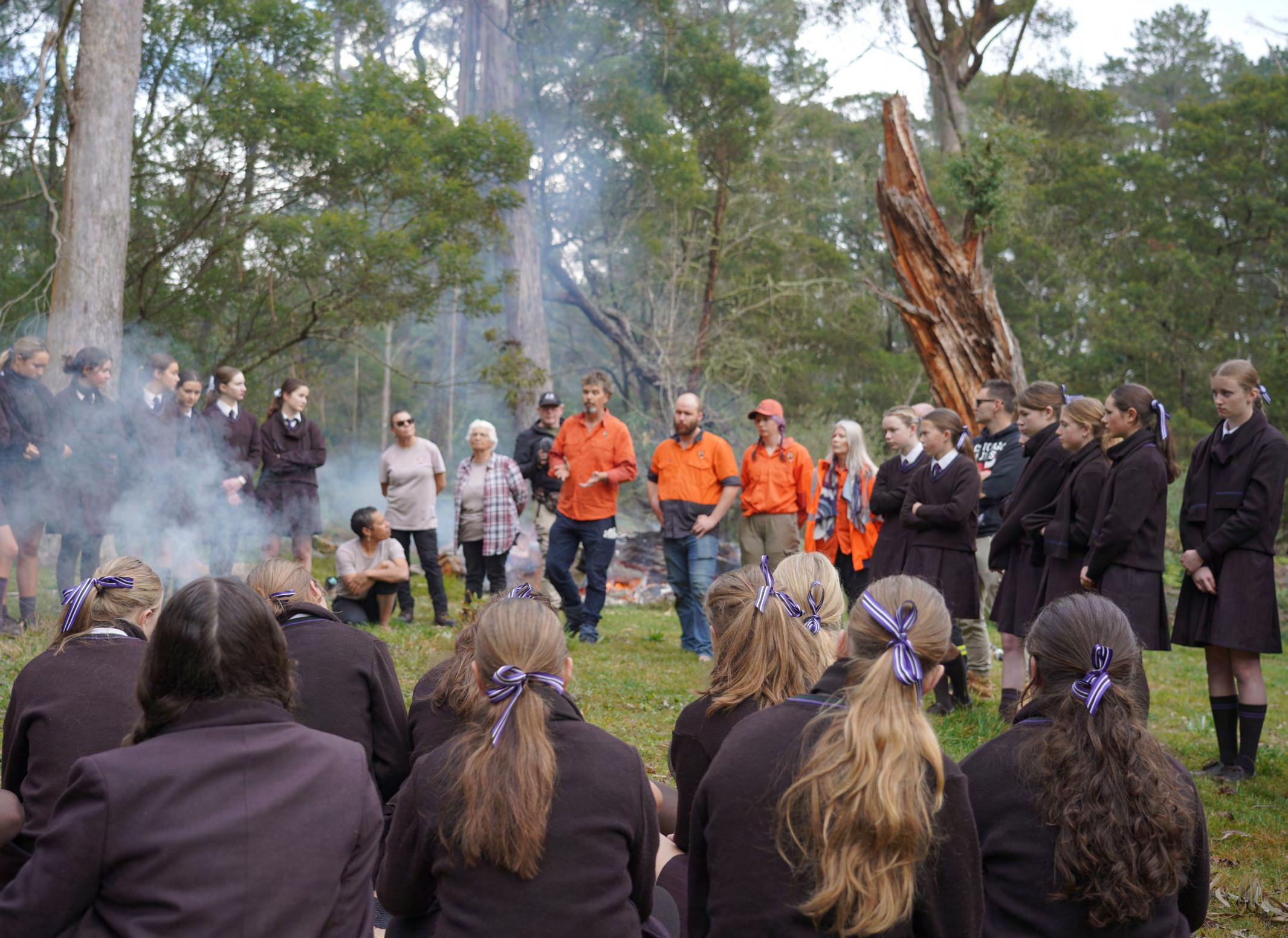

As the school year progresses, our Year 9 students have been incredibly busy on a journey of personal growth and discovery. Term 3 has been packed with diverse activities designed to build confidence, challenge limits, broaden perspectives, and inspire a sense of global citizenship. From scaling rock faces to serving their community, our students have embraced every opportunity to learn and grow.
The term kicked off with the highly anticipated 3-Day Residential Program at Global Forum. This immersive experience opened students’ eyes to their potential as local and global leaders. Through a combination of inspiring talks and hands-on community service, our Year 9 students gained invaluable insights into the power of individual action.
The program featured a range of activities that left a lasting impact. Students rolled up their sleeves for community service at organisations like Our Big Kitchen, Thread Together, and Days For Girls. They were inspired by talks from changemakers like Annabelle Chauncy from School For Life and listened intently to Rebecca Keeley’s Yarn Speech. Dr. Peter Anderson’s session on sustainability education sparked thoughtful discussions, while Monica Moore’s yoga session provided a moment of mindfulness. The program also included exciting team sports activities to foster a spirit of camaraderie and collaboration among the students.
“At Global Forum we have learned that we are in a privileged position that shouldn’t be taken for granted and we can use this to make a big difference in the world”
Year 9 Students 2023
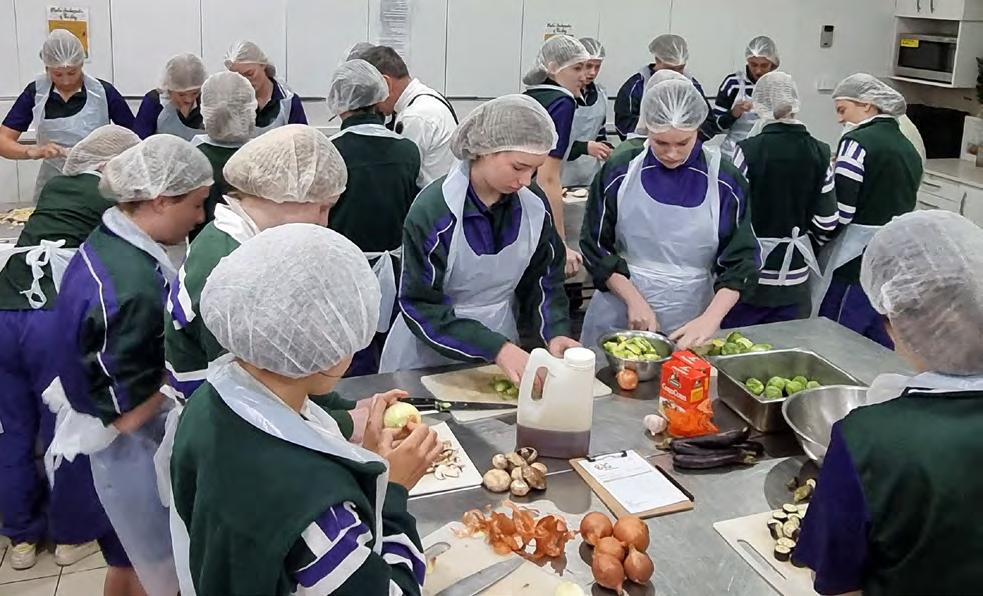
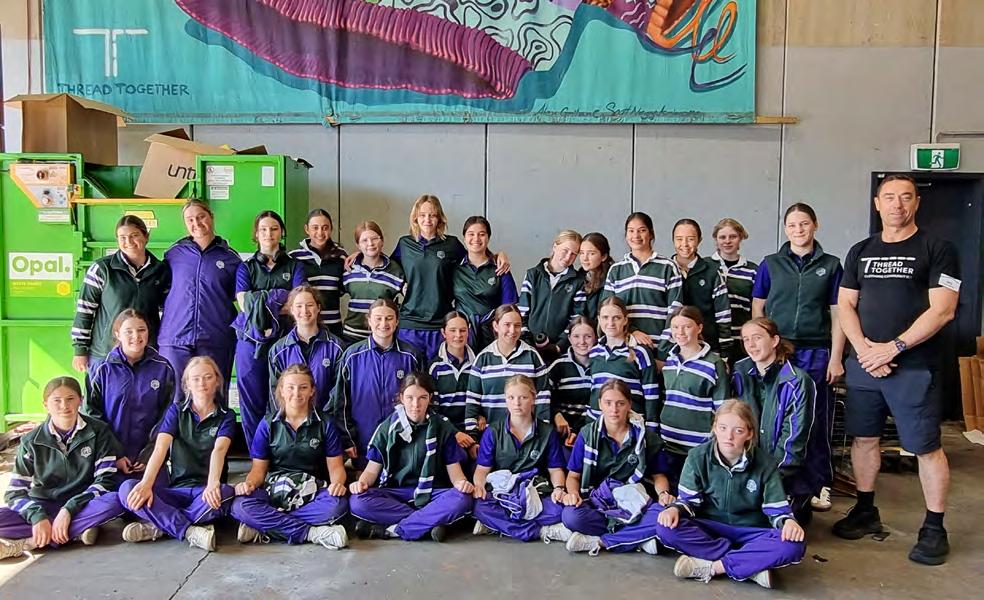
Following the residential program, our Year 9 students took on an action packed Adventure Day at Mount Keira. Students pushed their physical and mental boundaries through rock climbing, conquered fears on the rope ladder, and strengthened bonds through team challenges. This outdoor experience not only tested their limits but also reinforced the importance of perseverance and mutual support.
In the academic realm, our students rose to the challenge of the Cambridge Global Perspectives course. They submitted their second component; a rigorous academic exercise that allowed them to conduct indepth research on a topic of their choice. This project honed their critical thinking skills and encouraged them to explore global issues from multiple angles.
Looking ahead, our Year 9 students are eagerly anticipating their Bronze Duke of Edinburgh Award expedition. This upcoming challenge will provide the perfect opportunity to put their newly acquired skills into action, combining physical endurance, teamwork, and problemsolving in a real-world context.
Paige Day Coordinator of the Year 9 Jamieson Program
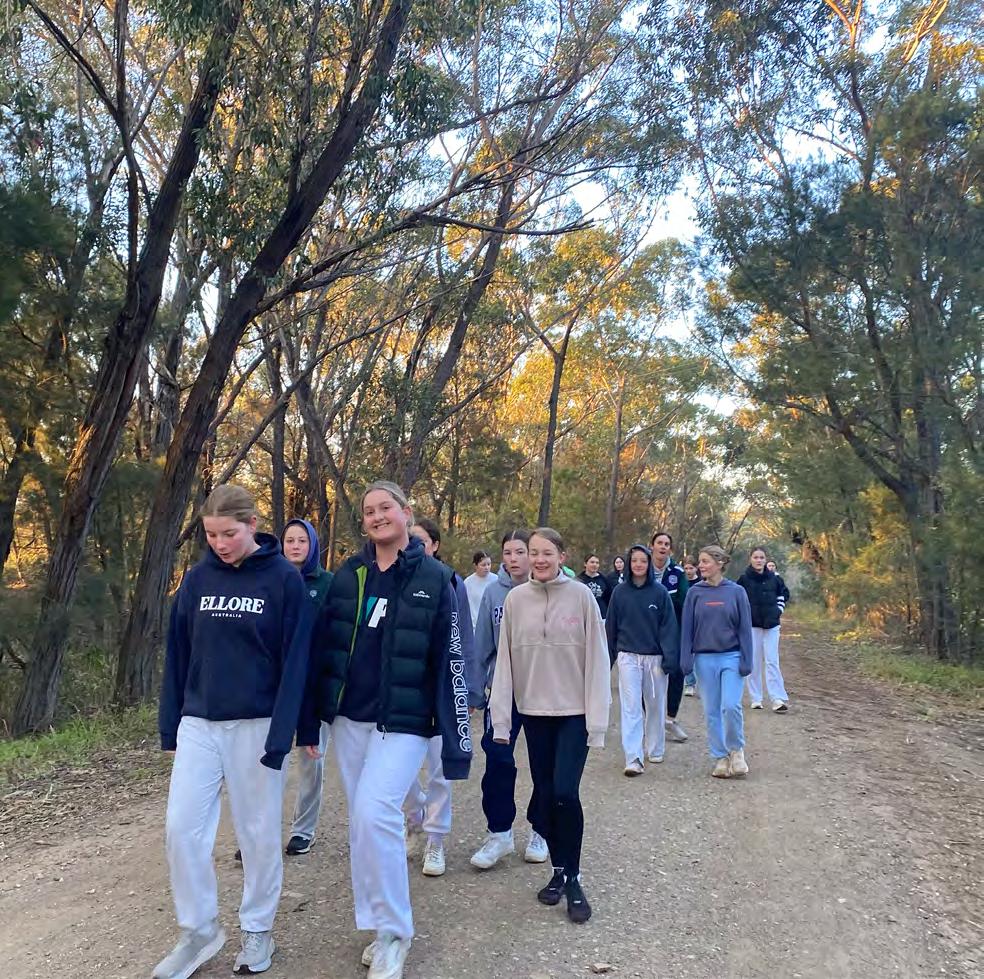



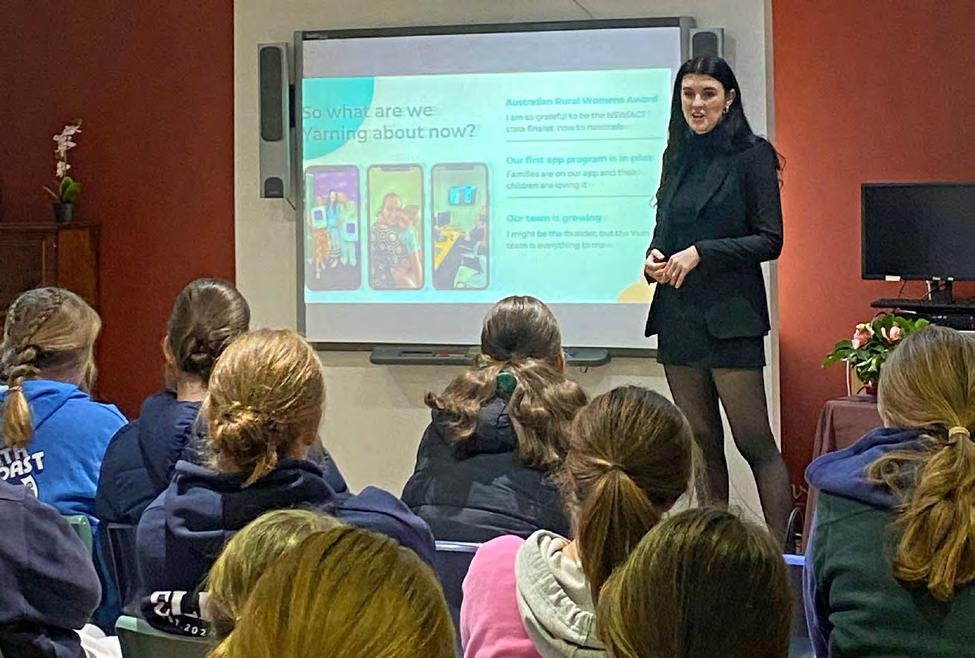
During September and October, Frensham students will be participating in the “It’s in the Bag” initiative, a campaign led by the Australian charity, Share the Dignity. This initiative aligns with our school’s strong commitment to community service and social responsibility by providing essential support to women and girls facing homelessness, poverty, and domestic violence. Established in 2015, Share the Dignity is dedicated to addressing the often-overlooked issue of period poverty, ensuring that no woman or girl has to go without basic menstrual hygiene products.
Involvement in the “It’s in the Bag” campaign will be led by our Year 8 students as part of the Jamieson Program. The Jamieson Program is designed to cultivate global citizenship, instil a sense of responsibility, and inspire students to demonstrate leadership by serving both their local and global communities. Year 8 student Annabelle Whyte-Cleaver expressed her enthusiasm for the project, stating, “I’m really looking forward to this project so I can help people, especially those my own age who are going through really difficult circumstances.”
The campaign focuses on filling bags with essential hygiene items, which are then distributed to women and girls in need during the holiday season. These bags represent more than just a collection of products—they symbolise care and dignity, offering comfort to those who are struggling.
Year 8 students have chosen to focus these efforts on supporting teenagers. “We decided to focus on helping teenagers because we can relate to their struggles. It’s hard enough being a teenager, but facing those challenges without basic necessities must be overwhelming. We want to show them that they’re not alone and that we care,” said Year 8 student Sophie Chin. Each bag for a teenager includes essential items such as sanitary products, shampoo and conditioner, soap or body wash, a toothbrush and toothpaste, deodorant, and additional ‘luxury items’ like makeup, hair elastics, facial

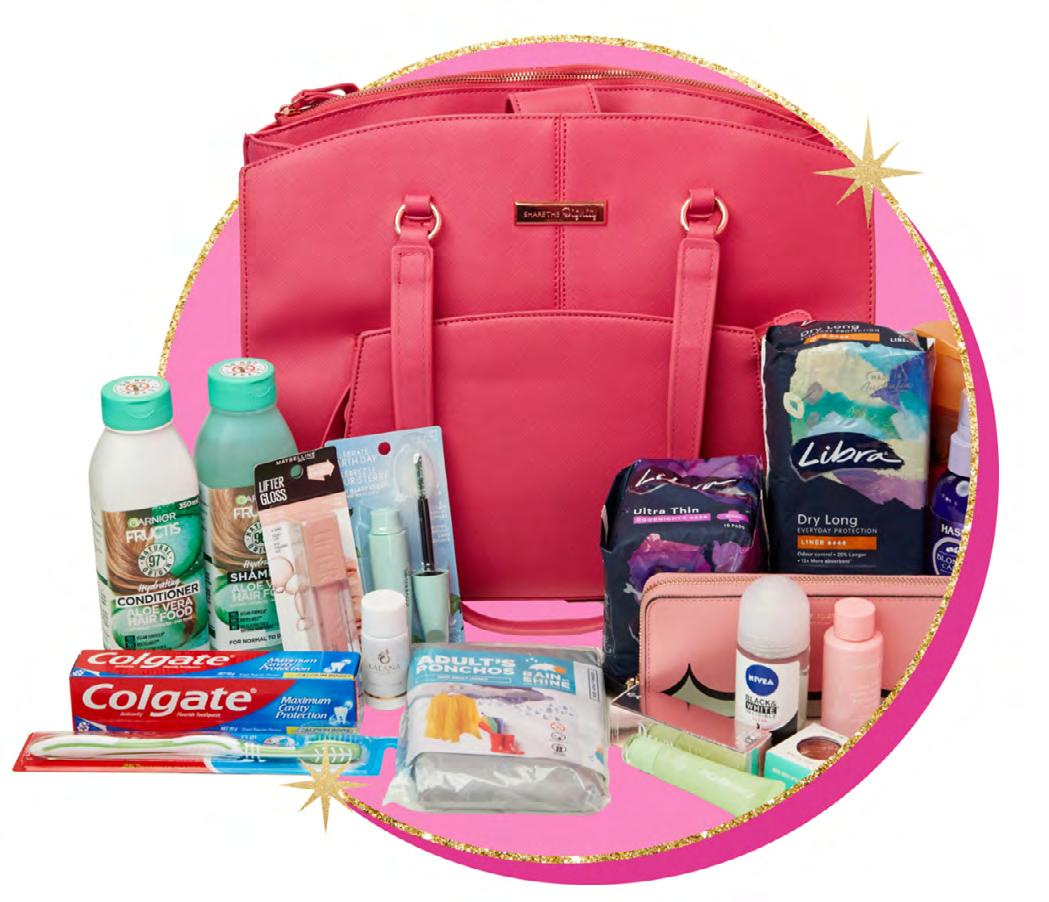
cleanser and sanitiser. Furthermore, Year 8 students will add handmade cards and friendship bracelets to each bag, making them even more personal and meaningful.
The Year 8 students have demonstrated great enthusiasm in organising and preparing for the collection of products. Sophie Laufer Robertson of Year 8 elaborated on the preparation process: “We have organised the creation of posters explaining the mission of Share the Dignity, which we are placing around the school. Some students will deliver speeches during morning prayers, and we are producing videos to post on the school’s Instagram to increase our reach and continue raising awareness. Additionally, we have arranged a Mufti Day to raise funds to complete any bags that are missing items.”
Frensham students will be collecting fullsized, unopened products from September 16 to Friday, October 18. We warmly invite the broader community to join us in this initiative by donating products or old bags through the Company Office. Together, we can make a significant impact on the lives of those in need.
Lucy Thorne Head of PDHPE
After a significant amount of consideration, consultation and collaborative design, Frensham Schools has decided to update its uniforms. The new uniforms bring together the rich history of Frensham Schools with a modern design, suitable for the active nature of our students. The fabrics are Southern Highlands friendly for our variable weather and cold winters.
Brown and purple will feature strongly in the new uniforms, holding true to our long standing traditions. The uniforms, in essence, will celebrate the features of the Iris, which is strong, resilient and can flourish in all conditions.
The new Frensham puffer jacket has been a popular addition to the collection and is already serving to keep our young people warm both on campuses when worn with their formal uniform and on the Games Field on a Saturday morning for sport. The flexibility of wearing it with both uniforms has been welcome in the colder months.
The Winter Uniform will be very similar to our current uniform; however, the cut and design of the pieces are intended to cater for all shapes and sizes and each stage of development. The brown tunic with a purple pinstripe will continue, with the new tunic having a belted section at the back of the dress which will allow for drawing the tunic in or out as needed.
The most noticeable change to the uniform is our new summer dress. The new dress is purple, much like the historical purple church dresses that many of our Frensham Old Girls wore in years past. The dress is one piece rather than the shirt and tunic and has a belted feature across the back. It also has darted pleats allowing for ease of movement and increased comfort in the warmer months.
The implementation process of the new uniform will be as follows:

• The summer dress will be available from Term 4 2024 with all students expected to be in the purple dress by Term 4 2025 (excluding Year 12 2025).
• The winter uniform will have a slower introduction, with all students expected to be in the new winter uniform by the end of 2026.
• Blazers will all receive new buttons during Jamieson week 2024 in preparation for Final Prayers and the Carol Service. Buttons will be charged to family accounts.
Summer dress uniform for girls (K-12)
• The implementation of the Frensham Junior School uniform change is still being confirmed at this time, however, Frensham Junior School students will have the option to wear the purple summer dress.
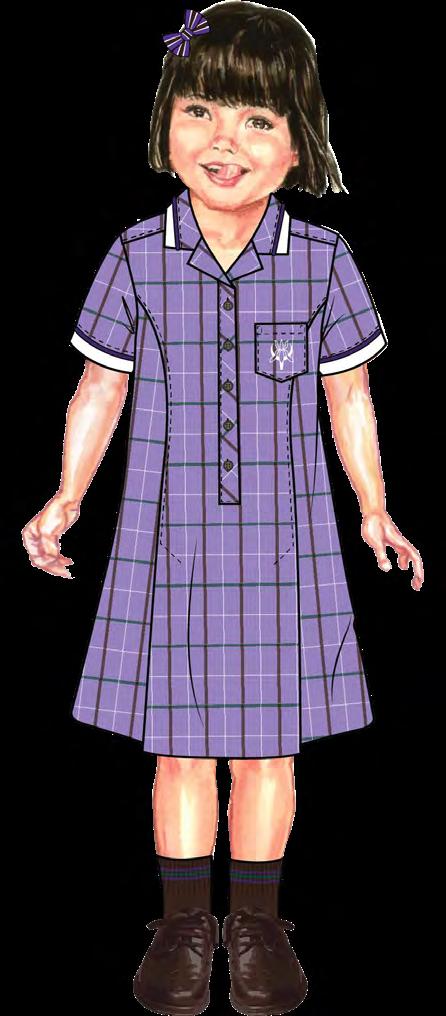
We look forward to the introduction of the new uniform across our schools. Should you have any questions, please don’t hesitate to contact me directly.
Sarah Tynan Deputy Head
of Frensham Schools
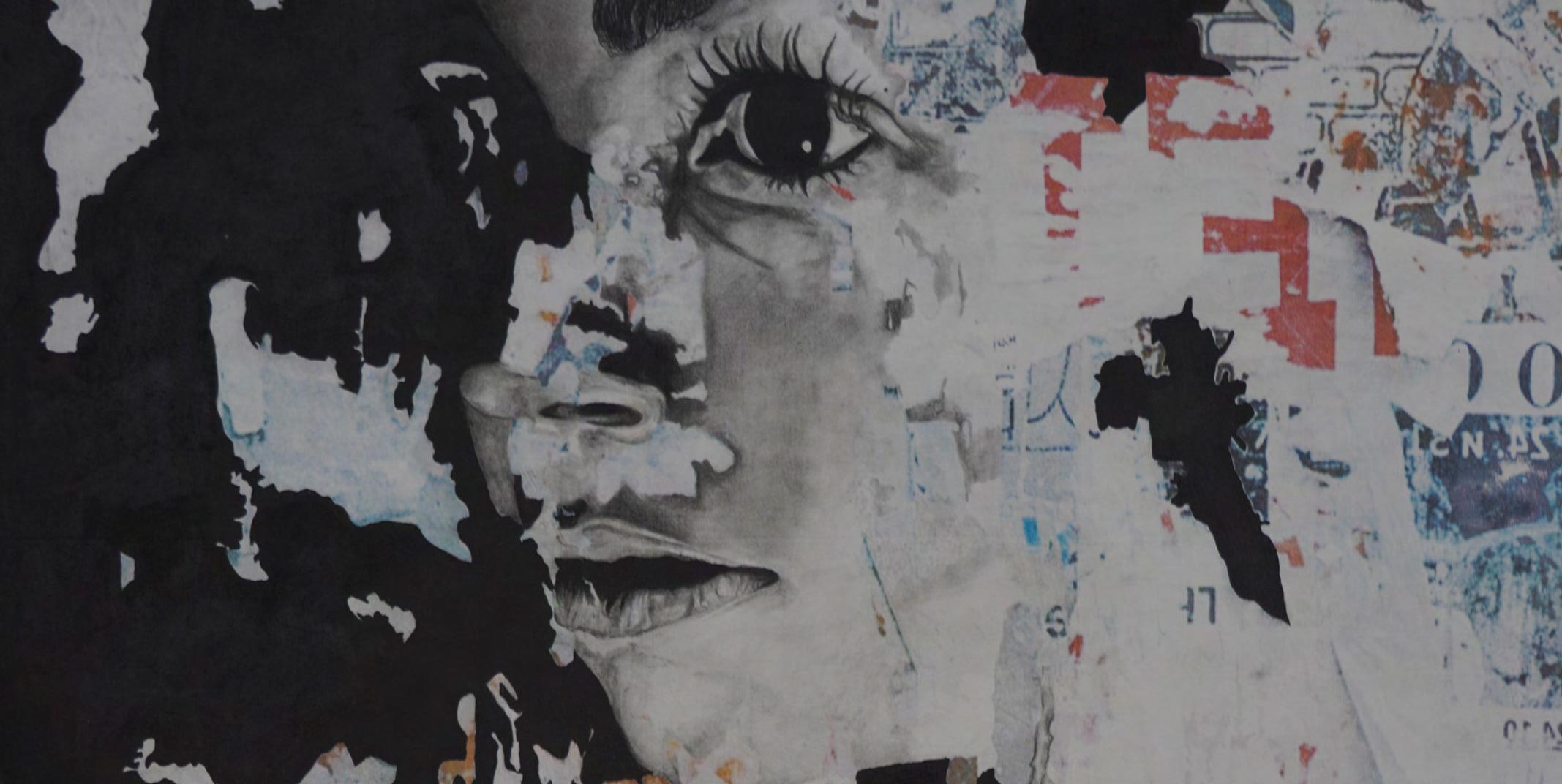
Ashley Brewer and Sophie Simpson discuss the benefits and the profound impact of vulnerability as the Year 12 Visual Arts and Design and Technology major works go on display.
As the Year 12 VA and DAT exhibitions open to the public, it’s a bit scary to think something we have poured hours of hard work into will be on display for anyone and everyone to see and judge. We know we aren’t alone in this sentiment - many of us feel this way, and understandably, because a major work is essentially a small piece of a person; it is their passions, beliefs, and values all condensed into one year of work. So, with the opening of the exhibition, we thought it would be pertinent to talk about the importance of being vulnerable, whether it be through selfexpression like our major works, the music and drama showcases (which were, by the way, amazing) or otherwise.
Vulnerability is one of the foundations of meaningful human connection. When we allow ourselves to be open and honest about our true selves - our fears, our struggles, our hopes - we contribute to an environment where real, substantial relationships can flourish. Think about the last time you felt truly understood by someone. It wasn’t because they presented
a flawless facade, but because they shared something raw and real. And it goes both ways - being honest and vulnerable connects us to one another, making our relationships richer and more genuine.
However, there is a pervasive myth in our society that vulnerability is a weakness. We are taught to present our strongest selves, to put on a brave face, and to never let our guard down. This idea is reductive, isolating and even dangerous. When we hide our true selves behind a mask of perfection, we miss out on the depth of connection that comes from sharing our authentic experiences.
Vulnerability is about courageously stepping into the unknown, facing our fears, and being honest about our imperfections. It’s about showing up as our true selves, even when we’re unsure of the outcome. These acts of bravery invite others to do the same, fostering an environment where mutual support and understanding can thrive. Creating art is a great way to practise vulnerability - something we embody here at Frensham with an extraordinarily strong VA culture.
It’s easy to take for granted the amazing artistic opportunities we get here, and we can often forget how fortunate we are - did you know that
across the whole state, more people do Legal Studies, Modern History, or Community and Family Studies than Visual Arts? And art here goes beyond simply drawing and painting; it empowers us as young women to engage with issues and ideas we are passionate about, without us even realising. Next time you see one of our talented VA teachers, maybe thank them for their hard work and support - without them, we wouldn’t have even been able to find a clean paintbrush, let alone construct a whole major work.

We, as Frensham students, are privileged to be able to experience vulnerability every day. Even something as small as singing hymns can seem daunting – but all it takes is one courageous Claudia to put herself out there to inspire others to do the same. Even if you consider yourself a bad singer, try finding the power and beauty of being part of a larger, connected group – the sound we make when we all come together is truly moving, and it would not be possible without accepting that we might make a mistake - or get a little embarrassed.
A mindset of vulnerability is also key to service and leadership. As Year 11 get ready to take up leadership roles at the end of this term, let’s remember that good leaders show vulnerability, and when they do, they are more able to inspire trust and reinforce a culture of growth and self-reflection, where everyone is encouraged to express their most true selves.

On a personal level, vulnerability allows us to grow and evolve. It’s through embracing our imperfections and acknowledging our struggles that we can begin to heal and improve. When we’re honest with ourselves about our challenges, we open the door to learning, growth, and self-compassion. Vulnerability is not just a way to connect with others; it’s a pathway to understanding and accepting ourselves.
In closing, let us remember that vulnerability is not a burden but a gift - one we are encouraged to practise daily here at Frensham. Keep this in mind if you have a chance to view the exhibitions – each came from a place of openness. Forty exceptional works were created with love and care by forty equally exceptional girls.
Every one of them has modelled vulnerability through their courageous willingness to display their intensely personal works, and we hope that each of you will be inspired by their examples. By embracing vulnerability, we open ourselves up to richer relationships, more profound self-awareness, and a more fulfilling life. It is in this courageous openness that we can find the true essence of our shared humanity.
Ashley Brewer & Sophie Simpson Year 12

The standard of performances is always inspirational for the younger musicians in the audience at the HSC Music Showcase. This year, there were six Music 1 candidates who, due only to time constraints, presented just two pieces from their programs of four. They were Madeleine Charters, Emily Crawford, Isabel Kenneally, Chloe Litchfield, Andie Robinson and Gigi Ulvert.
Unusually, the audience was also invited to listen to the recording of Sophie Chen’s sophisticated Core Composition. Sophie is majoring in Composition for the Music 2 course and, again, it was edifying for the girls to hear student composition at this level, and to be able to applaud Sophie at its conclusion.
One of the chief ingredients for Frensham’s strong results in HSC Music has been the extra support and experience they gain from the involvement of our professional music tutors
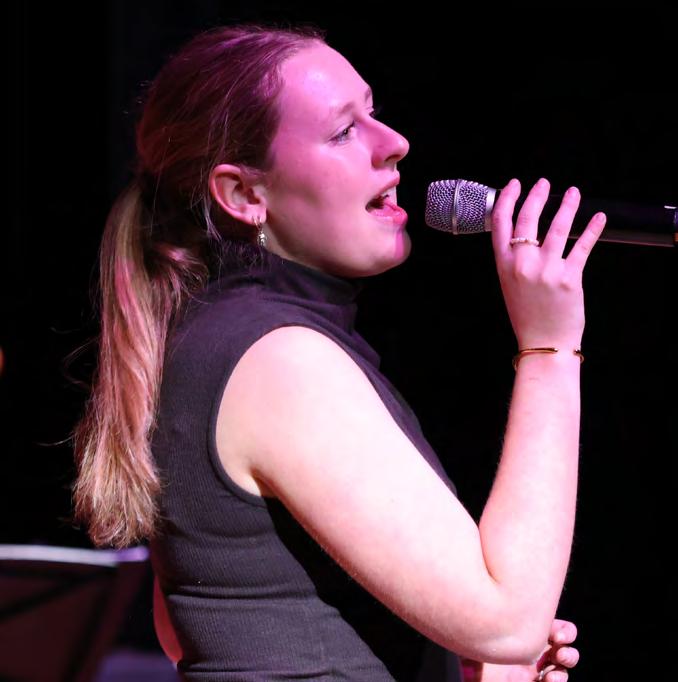
Mr Clarke (drumkit), Mr O’Neill (Bass/Guitar), Mr Marcon (Bass/Saxophone) and Ms Miller (violin). Tight, well-rehearsed accompaniment lifts any performance and having the opportunity to work with a professional band every week has been a privilege and point of difference for our HSC candidates.
Another wonderful form of support for our students are the Year 11 backing vocalists, who include Georgina Lewis, Lilla Stanford and Chloe White. These girls have given up much of their own time to boost the performances of their Year 12 peers and the candidates are all very grateful for their involvement.
As we move closer to the examination date, we wish the girls the very best for their final performances.
Michael Spencer Head of Music
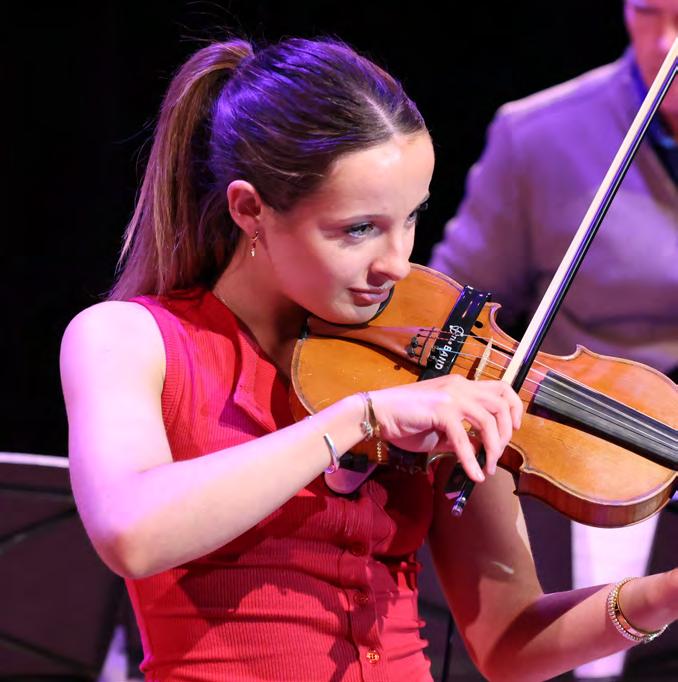
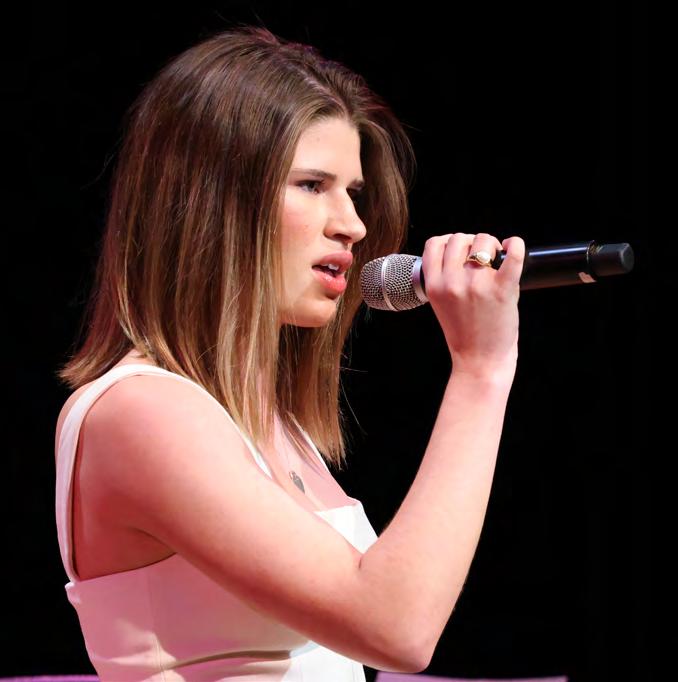
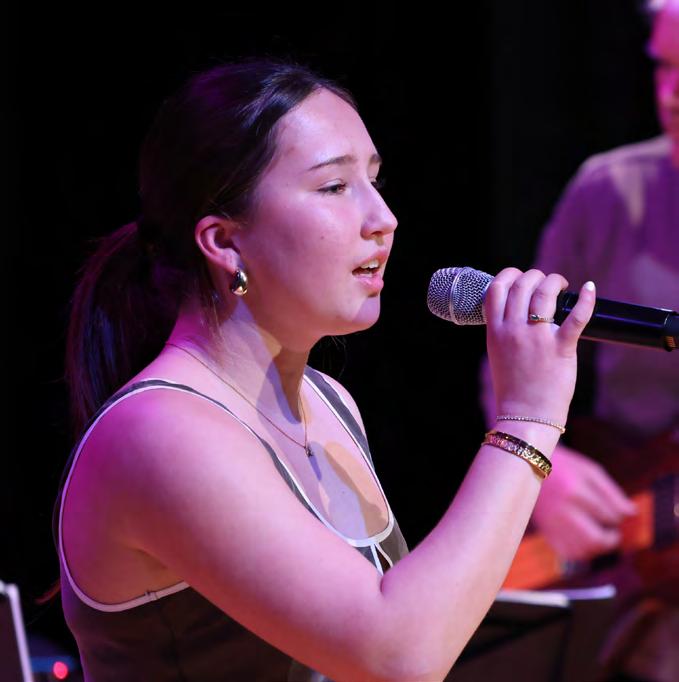
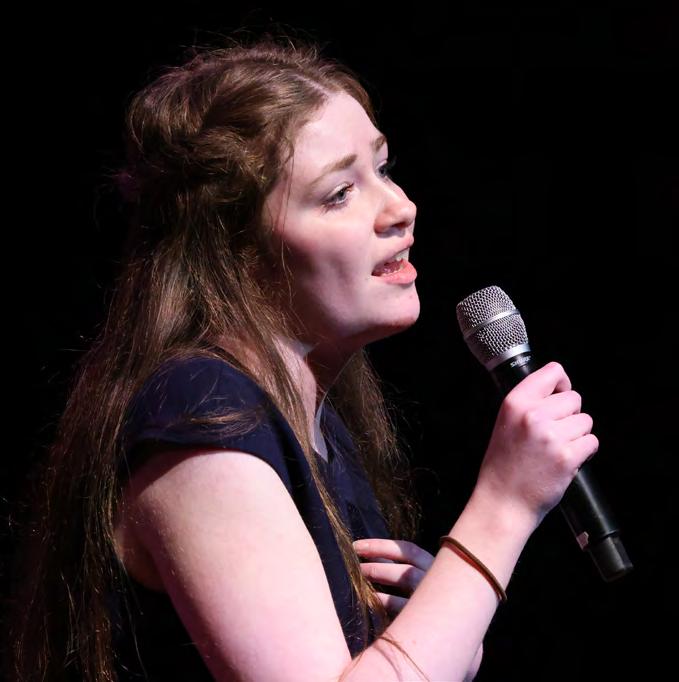
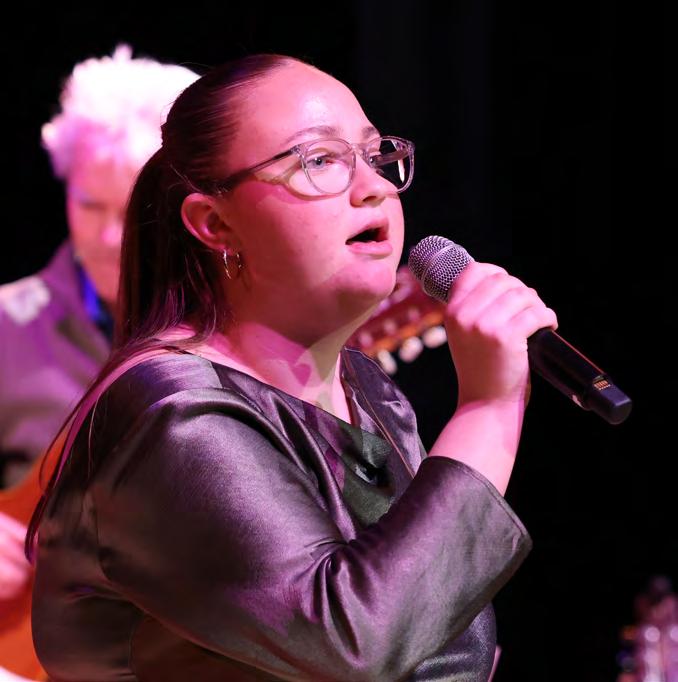
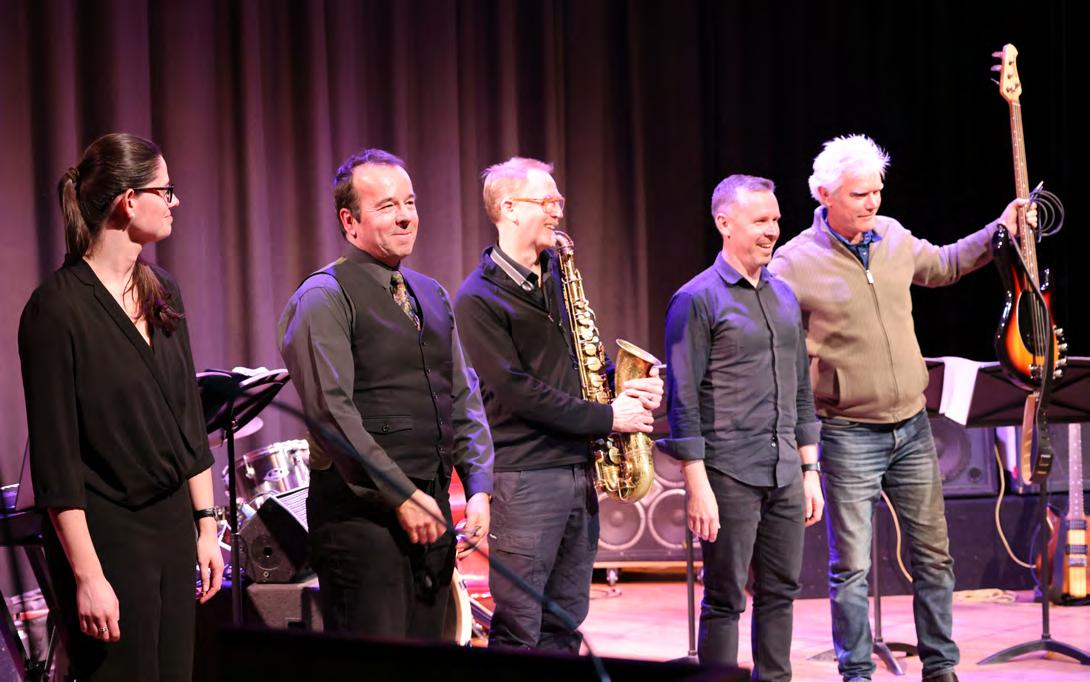


In recent Friday Prayers, students have acknowledged the profound impact of the musical life we experience daily at Frensham, and how this focus has helped connect Frensham to the wider community, through long-standing musical initiatives we participate in. Below, Isabel Kenneally and Chloe Litchfield discuss what music means to them and in the article that follows, Sophie Chen provides an update of her moving experience when helping out at the National Braille Music Camp.
Ever tried to watch a movie without the soundtrack? It’s like eating cereal without milk—just wrong. Music adds drama, excitement, and sometimes, it’s the only thing that makes sense in a scene. Imagine trying to get pumped for a big game without that epic pump-up song. Not Happening.
We want to tell you about the importance of music in our everyday lives, especially here at Frensham. Music is everywhere, whether you’re blasting it in your room while packing up your things at the end of the term, or listening to music while you are working away on a project. Music is the glue that holds our sanity together, especially during the toughest moments—like that last period on a Friday.
Music is the universal language. You could be anywhere in the world, and when that one banger starts playing, suddenly everyone’s on the same wavelength. Doesn’t matter if you speak the same language or not —when that one song plays, you’re all vibing. Music’s like that one friend who always knows how to hype you up.
But music isn’t just about those killer beats and catchy lyrics—it’s the one thing that makes even the worst situations better. Feeling homesick? There’s a playlist for that. Got a bad mark in a test? Time to crank up something loud enough to lift your mood. Seriously, music is like a magical reset button.
Music also helps us escape. Stuck on the bus? Pop in some earbuds and suddenly you’re not surrounded by a bunch of loud strangers and instead you’re in your own music video, and the world is just background Noise.
But it’s not just about escapism. Music also brings people together. Whether it’s at concerts, parties, or just jamming out with friends, it’s one of the few things that can get a whole crowd moving in the same direction. And let’s be honest, nothing feels better than belting out the lyrics to a song you love, even if you’re totally off-key.
So, why is music important? Because it’s the one thing that’s always there when you need it. It’s your hype women, your therapist and your partner in crime.
As music students here at Frensham, we have had a unique opportunity to not only appreciate music but also to create it ourselves. We have spent many years enjoying the benefits of being in ensembles at Frensham. Not only did we hone our musical ability, play incredible pieces and develop our performance skills, we also learnt the value of teamwork, we learnt to listen to others, take on feedback, fail, and make mistakes.
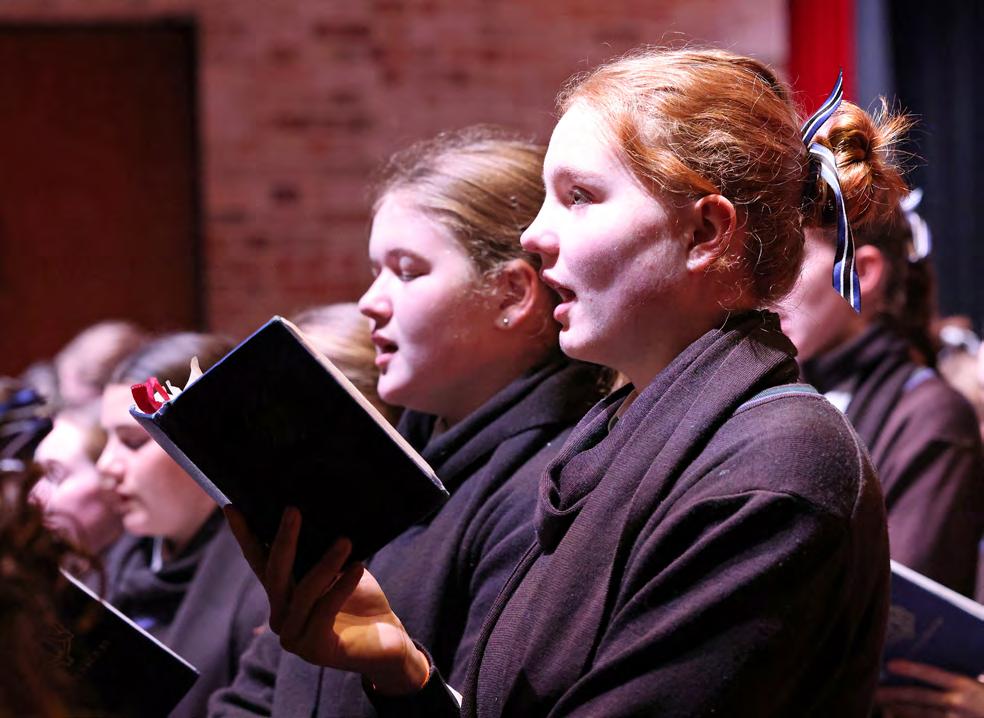
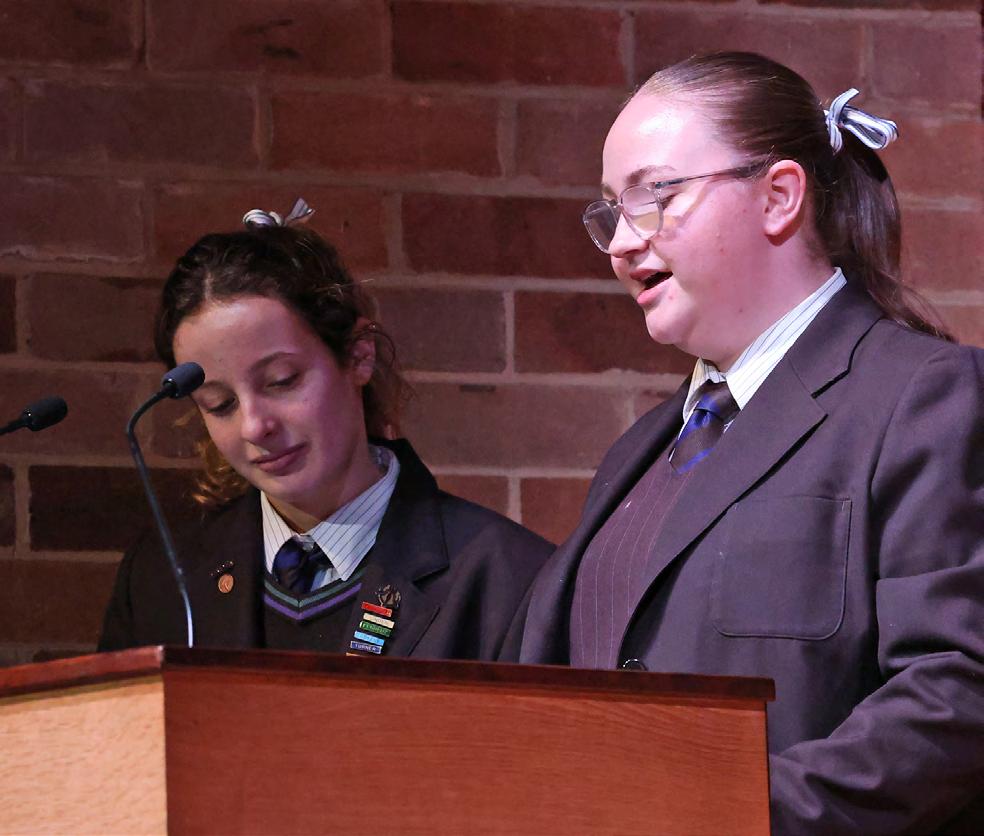
In short, music makes life better. Without it, we’d be stuck in the endless loop of day to day activities and awkward silences. So, keep singing, keep playing, keep the tunes coming, keep dancing like nobody’s watching and remember: life is better with a soundtrack.
At the annual HSC Music Showcase recently, we had the opportunity to share the incredible talents of our Year 12 Music class. It was a chance to celebrate the hours of rehearsals, skill development and performance practice with the entire school community. Lastly I would like to acknowledge the unwavering support of the people who have worked tirelessly to uphold the unique tradition of music at Frensham. Mr Spencer, Ms Boulton and Ms Madden. Now girls, look to your left, now look to your right, those girls... they’re your choir. Singing is the brick and mortar that has created the foundation of this school for the past 111 years.
In conclusion, we would like to end with an excerpt of a song from ABBA that really reflects the power of music: “Thank you for the music, the songs I’m singing. Thanks for all the joy they’re bringing. Who can live without it? I ask in all honesty. What would life be? Without a song or a dance, what are we? So I say thank you for the music, for giving it to me.”
Isabel Kenneally & Chloe Litchfield Year 12
The National Braille Music Camp has been held on the Frensham campus annually since its inception in 1986. During the first week of the holidays, I attended the camp as a student helper, working with over 40 visionimpaired and non-sighted students and staff. Students flew in from every state/territory in Australia (including two from New Zealand). They stayed for six days in Linden Turner.
This camp was first started by Ian Cooper –who was also blind – and his first wife Roma Dix in 1986. Mr Cooper was the Head of Music at Frensham for 40 years until he retired in 2000, having left a significant impact on the musical life of this school. During the camp, I could feel Mr Cooper’s legacy more than ever.
Helping out at the Braille Camp was an extremely enriching and humbling experience - there were times when I found myself having to take a step back and give myself a reminder about perspective. On the first day of camp, because I was a student at Frensham, I was inevitably asked by a group of enthusiastic camp students to give a tour of the entire school. After a slow but energetic hour and a half of trudging canes and service dogs from the Deer Pond to the Holt Farm, we found ourselves standing in the centre of the Games Field. Upon hearing that we had arrived at a field, some of the younger students dropped their canes, which confused me. One by one, everyone started dropping their canes, and
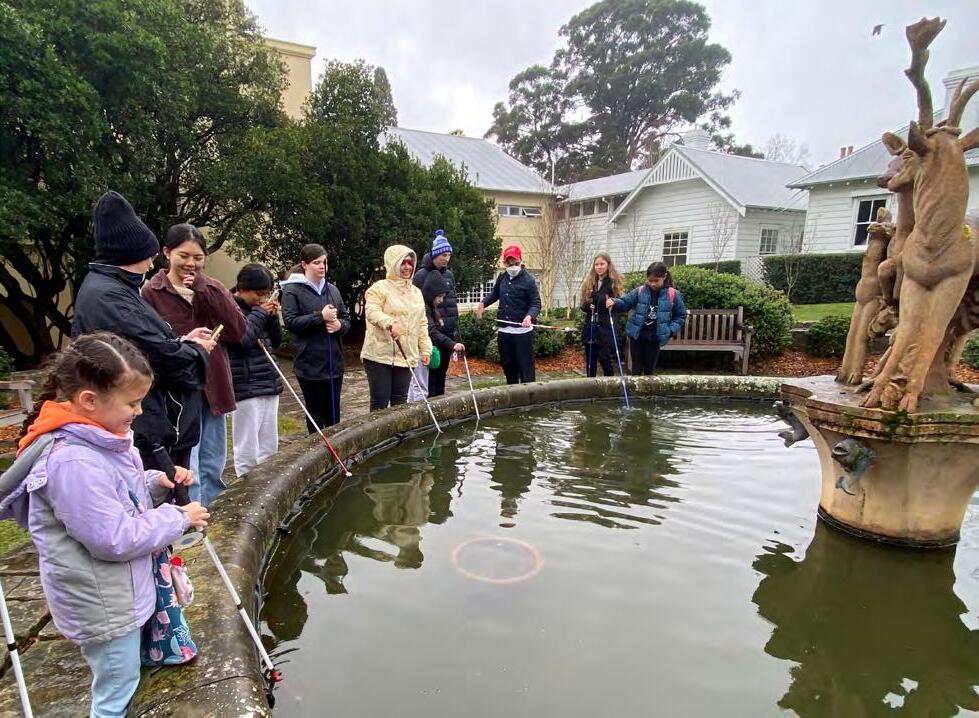

began to sprint like the wind, racing from one end of the Games Field to the other. I asked a staff member why everyone had suddenly started running, and she told me that for some of these students, it’s been years since they’ve had the opportunity to simply run free, without needing to be tethered to a cane or worrying about bumping or tripping. Seeing these kids being kids, I realised all the small things in life that I had taken for granted.
The six days I spent at the camp was as much a test of character as it was a test of my skill as a musician. In fact, I thought I knew something about music until I attended the Braille Music Camp. As a Frensham student, I know what good singing should sound like. So, you can imagine my surprise when I walked into the Orchestra room at 9am on the first day of camp, and was immediately made to sight read in three-part choir harmony. Needless to say, I was humbled as I struggled to keep up with the choir, being without the sheet music I’ve been so used to.
One of the most important aspects of the Braille Camp was the singing. We sang grace in three-part canon before every meal, we sang rounds during classes, and I often saw groups of students singing in the boarding house. Often at lunch, you could hear them singing in harmony from the other side of the hall. More and more people, including the staff
MUSIC would join in, until the entire dining hall was alive with song. Even the kitchen staff would stop to listen. We were undoubtedly inspired by the contagious joy that music can bring.
Each day started off with all students singing in choir until Morning Tea, before breaking into groups and attending Braille Classes in Glenn. During these classes, I learned to use a ‘brailler’ – a machine that punches braille into sheets of paper.
The students worked on score-reading, aural skills, and music theory using the ‘Read, Sing, and Play’ book written by Mr Cooper himself – which aims to teach music theory to the vision impaired. The entire book was notated by Mr Cooper’s own hand in braille, then later transcribed into print.
Every day after dinner, we held a small concert in which students of all levels and ages performed for their peers and shared what they had been working on. During one of these concerts, we were lucky enough to be presented with a recital in the orchestra room by Frensham old girl and acclaimed Australian violinist Myee Clohessy. On the evening of the last day, we held a final concert, in which the seats of Clubbe Hall were packed with people from the public. I felt deeply privileged to be singing and playing among these talented young musicians.
I firmly believe that music has the ability to empower and inspire. I saw this first-hand at the National Braille Camp, but I also see it every day at Frensham. Being back at school now, I have a newfound appreciation for our musical tradition founded by Mr Cooper and carried on by Mr Spencer. There is no doubt that Mr Spencer’s service to music for the last two decades and counting is the pride and joy of this school. Even more so, it’s the students who are at the heart of it. So, let us recognise and celebrate the music in our daily lives at Frensham – because it has the incredible ability to spread joy and foster connection.
Sophie Chen
Year 11
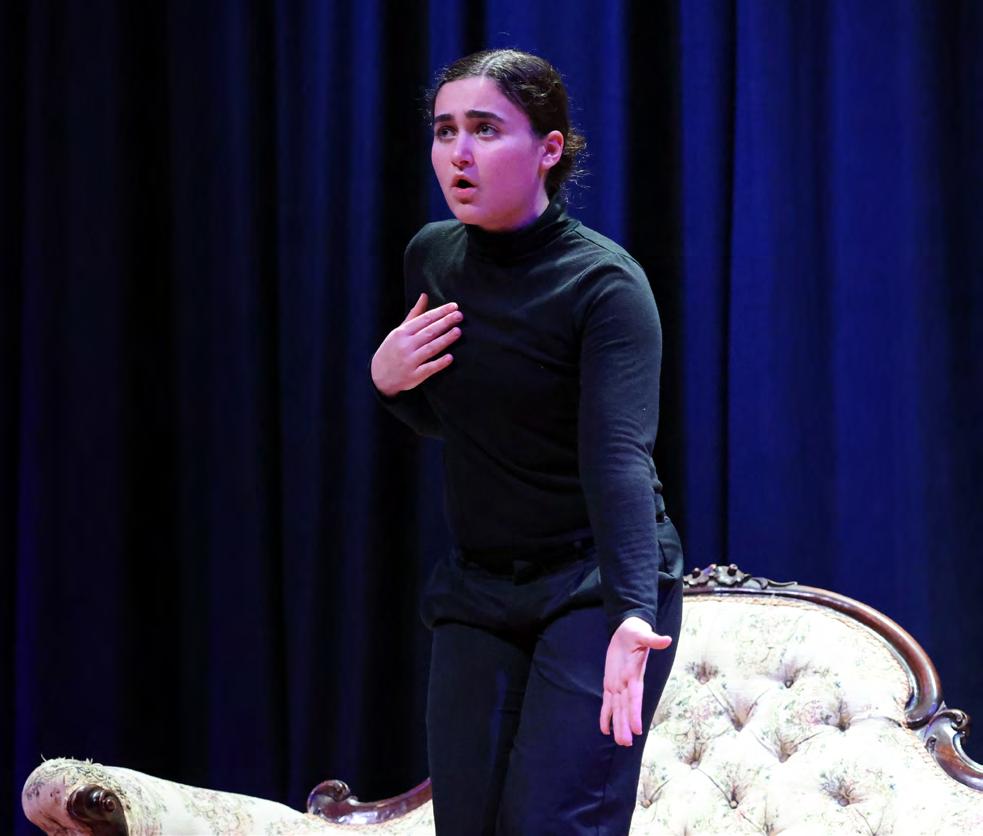
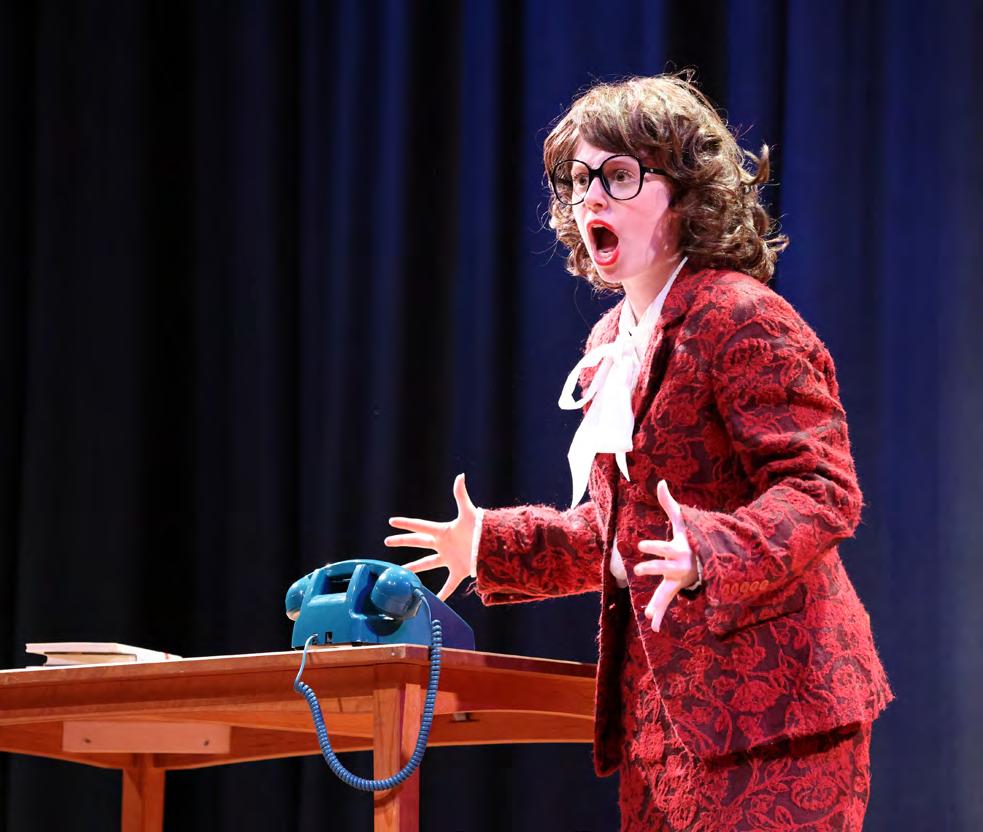
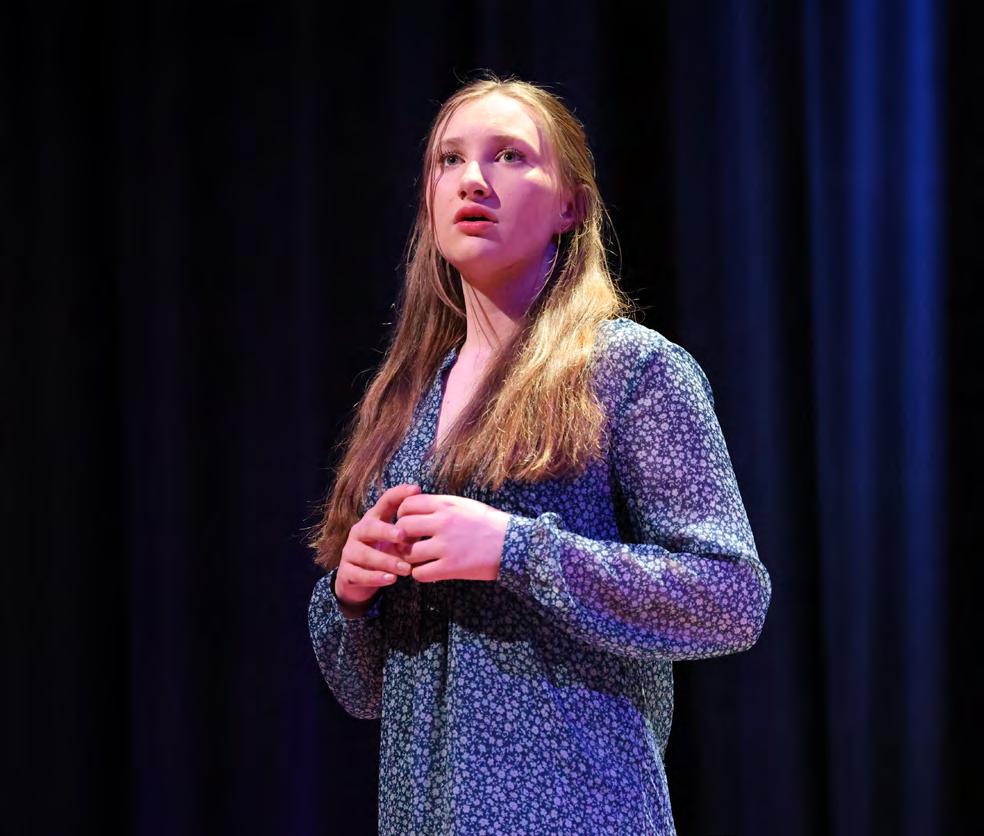
Frensham Junior School students had some notable success in Equestrian events recently. Aria Proctor in Year 2 represented Frensham Junior School at the Arndell Anglican College Interschool Equestrian Carnival. Aria and Indi She’s All That (Ali) had an incredible day together competing in the Primary Intermediate ring to achieve the following results:
• 1st - Best Presented Year 2 Rider
• 1st - Year 2 Rider
• 1st - Show Hack ne 12.2hh (Kindergarten to Year 6)
• 2nd - Year 2 Handler.
Aria then went on to be declared Champion Rider (Kindergarten to Year 3) and Ali was Reserve Champion Show Hack (Kindergarten to Year 6). This was a huge achievement for Aria and the school especially as she has only just stepped up to ride this more advanced pony.

Valentina Hercus in Year 6 won the Children’s Championship at the Sydney Showjumping Championships at Windsor Polo Club recently, with her horse Bellhaven Jazz. She also had a victory on her grey mare, Poppy, taking out her second championship win in consecutive weeks at the Showjumping Championships at Boneo Park. She won the children’s championships at
the GDP Classic in Victoria and the Children’s Championships at the Victoria Showjumping Championships.
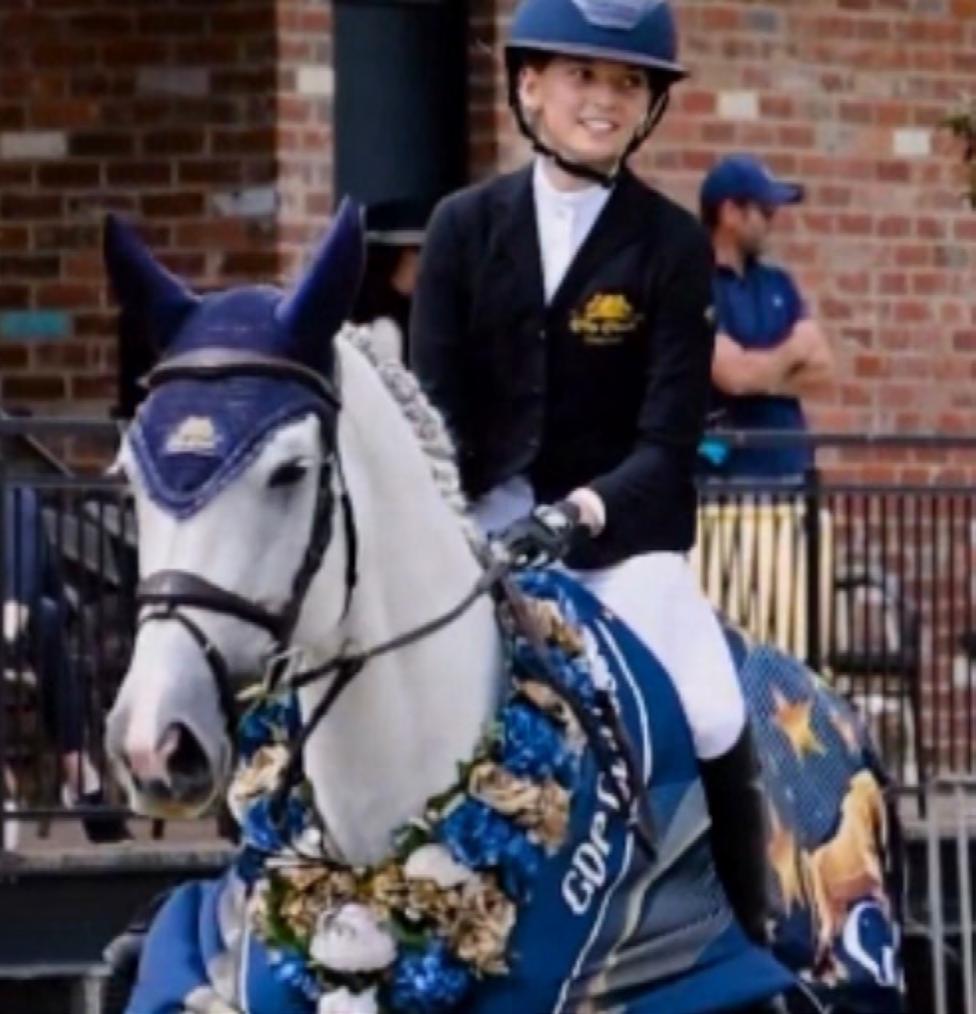
Iliana Hercus in Year 5 placed 4th in her division on her pony, Valentine and 1st in the under 18yrs at the Waratah Winter Showjumping Classic in the 85-90cm category.
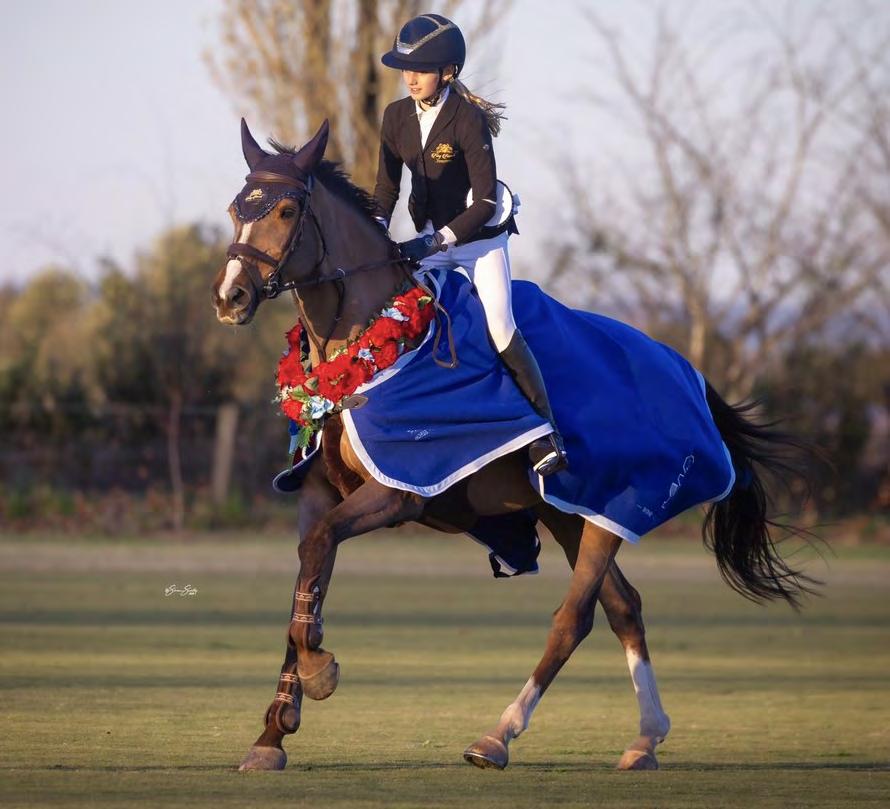
Anne Graham Deputy Head Frensham Junior School

